My father,
Thomas Mathieson Sutherland (Sr.), was born in Gallonfield, (Gollanfield?)
Inverness shire, Scotland, in 1870. There is a story about the name "Mathieson"
and, as I recall it, one of our forbears was such a bonnie lad that a
well‑to‑do man named Mathieson wanted to adopt him and make him the
heir. However, those responsible did not wish to see the name
"Sutherland supplanted by "Mathieson" and the offer was declined, but
the name "Mathieson" was integrated in the lad's name.
I do
not remember Grandfather Sutherland, although I have a vague
recollection of visiting Granny Sutherland who lived in a cottage on the
shore of the North Sea, almost in the shadow of Fort George in the
vicinity of the city of Inverness. One day while the folks were wading,
or however they frolicked in those days in the water, they noticed me
walking back towards Granny's home. When they caught up to me I told
them I was on the way to get a kettle of hot water to warm the sea.
Dad,
and his sister Bella, were the youngest in the family (there were over a
dozen of them and I can recall seeing a photograph of the whole family,
Dad and Aunt Bella being seated on the floor in front of the group ‑ all
of the male members of the family sported full beards.
Dad's
eldest sister, Mary, was quite an influence in his life. She married
Malcolm Bruce who became the head Steward in Lamb's Hotel, a temperance
house in Dundee. Uncle Malcolm sent Dad "The British Weekly" for many
years. I have the impression that Dad was with the Glasgow Police for a
time, and he studied at the Glasgow Bible Training Institute, part of
the student's' duties being to go out and conduct street corner meetings
in the evenings.
Mother, Margret Wilson Sloan, was born in 1872 in Howwood, Renfrewshire,
where her father, William Sloan, among other things, was the local
postman. She had one brother, Will (Wull) who was married and lived in
Paisley; three sisters, Flora (Mrs. Archie Whitehead) a widow; Mary
(Mrs. Robert Moore, and Annie who married later and moved to Eccles,
near Manchester.
Mother
and Dad were married in Goven early in 1898 and they lived in Howwood
where Dad worked in a local mill as a cloth finisher.
I,
also Thomas Mathieson Sutherland, was born in June (23), 1899, and I
remember we lived in one of the two gate houses on either side of the
"policy" (driveway) leading to Castle Semple ‑ which sounds like the
place Rudolf Hess was heading for when he landed in Scotland and was
made prisoner‑of‑war. Dad's sister Bella (Mrs. Andrew Eason) and family
lived in the opposite gate house as her husband was a gamekeeper on the
estate. I have a recollection that "Uncle Andrew was home from the war"
‑ the South African War. After a shooting party on the estate the dead
hares were left in a pile near their house. My cousin Andrew Eason was
about my age and we were curious about what happened when we squeezed
the carcasses. I went fishing by dangling a string from a small stone
bridge over the White Cart, a small stream nearby.
They
used to tell of an evening when dad took me with him when he went to
attend a meeting of the com‑mit‑ee of the "Co", the local Co‑Operative
shop. He left me at Aunt Flor's and they say I spent the whole evening
greeting (crying) and pleading "Take me to my daddy".
We
later moved to Wardrop Terrace in the village where it was a pleasure to
climb into bed with mother after dad had gone to work, but having to
yield the favored spot in time to another and be content to lie
"back‑to‑back" with her. Then there were the Sunday morning walks with
"Faither" along the country road past farms hearing the sounds of
poultry, sheep, cattle and horses from the fields and byres, and church
bells ringing in the distance as we made our way along the three mile
walk to "kirk" in Kilbarchan.
I had
a scar from "scabby face" (impetigo?) and a cut scar from the tip of my
right thumb to beyond the first joint, and these, with all my freckles,
were erased in 1918 when I was severely burned. I had scarlet fever and
was in a nearby hospital ward with other youngsters, and the blinds were
drawn. As we recovered great patches of skin were sloughed off, the
sole of one lad's foot peeling off in one piece. When returning home we
passed a building with a "black flag" and I was told it was a jail , and
the black flag was flying because someone had been hung that day.
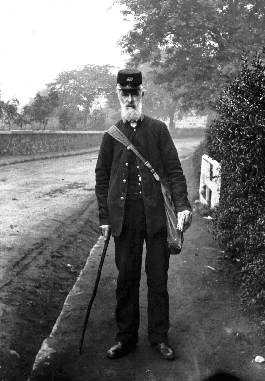
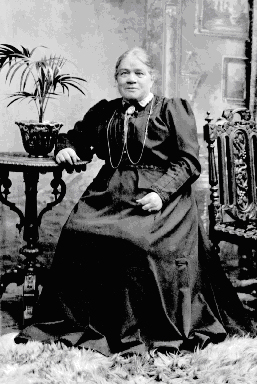
Father Sloan
Mother
Sloan
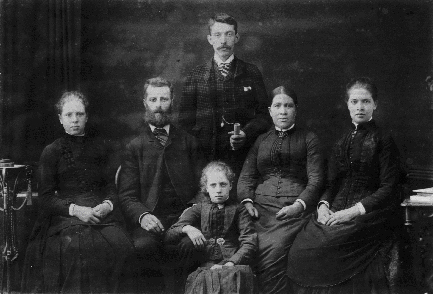
The Sloan Family
Will
Margaret (Maggie) Father (William) Mother (Ann) Flora or Mary
Annie
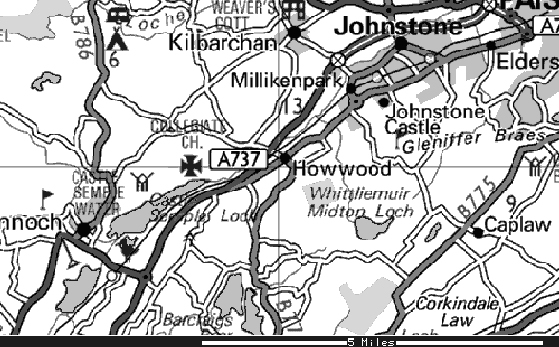
Expanded map of the area
showing Castle Semple Water, Castle Semple Loch, and the Collegiate
Church. Also shown is the town of Kilbarchan mentioned in the text.
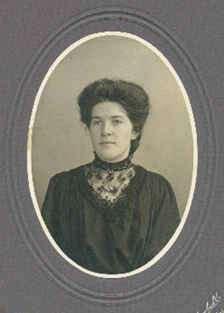
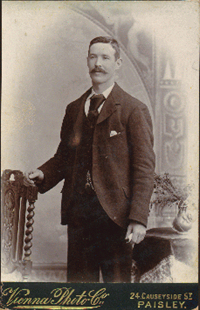
Left: Aunt Mary (Sloan)
Moore. Right: Father
One
day when Granny and Aunt Flora were in having tea with mother, Willie (Wullie)
Whitehead, another cousin about my age, and I were having fun jumping on
a board over a little "burn" splashing water up , when through the
bushes we saw Agrandfaither@ coming along the bank. He called to us,
but we took to our heels and headed for Wardrop Terrace and managed to
get in and shut the door before he got there. I was next the door knob
and when he forced the door open I was pushed up the stairs and kept on
going, but Wullie Whitehead was trapped behind the door. I went in to
the room where the folks were, and when they asked about the commotion "doon
stairs" I said "Grandfaither was leathering Wullie Whitehead."
William Mathieson was born in 1901, and I recall his first accident
several years later when we were trying to see Christmas goods in the
window of a shop. The window was too high for us to see well, so we
stood back then ran and got a toe on a protruding stone which enabled us
to get a momentary glimpse of what was displayed inside. Unfortunately,
Bill stumbled and fell smashing his forehead against the stone he should
have put his toe on ‑ he had a cross shaped scar on his forehead for the
rest of his life. He and I sometimes stood on the "green" below the
second floor window where we lived, and we would call until mother
appeared and we would ask her to "throw doon a piece and jeely" and
would wait until she tossed down a paper wrapped packet holding a jam or
jelly sandwich. From the upstairs window on the other side of the
terrace we could look down on the street and see what was moving, maybe
a steam lorry, perhaps a "Punch and Judy" show, or the ice cream wafer
man.
Isabella Cameron was born in 1905. Selecting a name for the first
daughter was a problem. Dad's mother was "Bella" and mother's "Annie",
but Annabella was out of the question as that was the name of a
notorious woman in the area. Hallow E'en was a festive occasion, with
groups of youngsters going from door putting on little performances, one
being a story by two youngsters in costume, and it went something like
this:
"Here come
I, Gilloshawa.
Gilloshawa is my name.
My sword and pistol by my side
I hope to win some fame."
"Some fame,
sir, some fame?
That's not within your power.
I'll cut you down to inches
inside of half an hour!"
Then the
two would go into their performance. Other visitors might be
blindfolded and led to the hearth where bowls were lined up containing
various objects or ingredients, their fortunes being told according to
the contents of the bowl they touched , and, of course, there was the
usual ducking for apples.
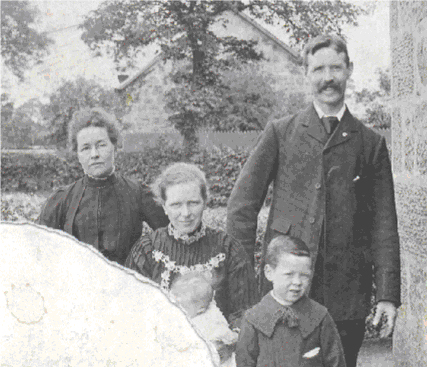
Grace
Moffat (left) with Mother (centre) and Father (right). TMS lower right
about 5 years old. Partial baby probably Isabella and William may have
been on the torn corner part.
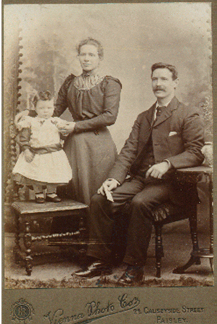
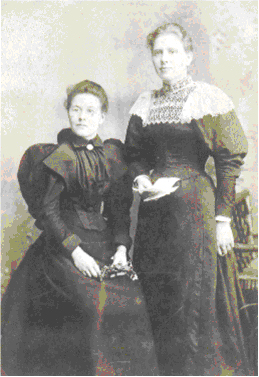
Left:
Mother, Father and TMS about 2 years old and Right: Grace Moffat and
Mother
Times
were difficult, and mother's sister Mary and her husband, Robert Moore,
with his brother Wilson and family, emigrated to Canada and settled in
Elgin, Manitoba, a "local option" area. Good news was received from
Canada, and late in May, 1905, we sailed from Glasgow on the Allen liner
"Mongolian". As the lines were being cast off, the people on the ship
joined with those on shore in singing "God be with you till we meet
again." I don't remember much about the voyage, but dad kept a diary,
and in after years we youngsters enjoyed reading it, always getting a
laugh when we read "Maggie had the colley wobbles this morning."
Elgin
was on a Canadian Northern branch line about a hundred and sixty miles
southwest of Winnipeg, served by daily passenger trains to and from
Winnipeg, and, of course, freight trains. We lived in a small house
next the "Hornerite" (holy roller) church. There was a little heater in
the room where dad and mother slept, and one morning mother got up, put
some kindling in the heater and threw in some coal oil. The ashes must
have been hot for flames immediately flashed out and mothers
flannelette nightie blazed up. Dad was right there and managed to
smother the flames and mother wasn't injured.
Shortly after our arrival in Elgin, a letter was received from Dundee
telling us that Polly, one of the Bruce daughters was quite ill. She
wakened from a nap one day and said to Aunt Mary, "I just had a
wonderful dream. Jesus came to me and said "Not yet, daughter, but in a
fortnight, and your mother will be with you in a month." They were both
buried inside that period.
There
was an eclipse of the moon about that time, and it had been explained to
me in such a way that when the eclipse was in progress I thought I could
see pieces of the moon being cut off and falling to the ground in the
shape of orange sections.
In
Elgin, steady jobs were few, particularly for newcomers, and Dad had to
turn his hand at anything he could find to do. He began to do a lot of
painting of houses (white with green trim) and barns (red) in Elgin and
neighboring communities. On a shed at one of the farm homes he painted
(exactly as he might have written it in longhand) "Laugh and the world
laughs with you. Weep, and you weep alone."
He
also took an active part in church affairs, and at home we had scripture
reading and prayers, morning and evening. There were two texts (silver
letters on a dark background) which hung on the walls of the homes we
occupied, one being John 3:16, and the other
"God is the
head of this house.
The unseen guest at every meal.
The silent listener to every conversation.
In all thy ways acknowledge Him and
He will direct thy path."
The
strongest expressions we heard Dad use were "dash it", which with his
accent sounded like "daysh it," or "confound it". All weekend chores
had to be completed on Saturday, wood brought in, water pails filled,
boots polished (Dad even polished the insteps of his boots), and, of
course, it was the weekly bath night with a tub of water in the middle
of the floor in which each in turn took his or her place, perhaps the
younger ones doubling up. Sunday was a day for worship ‑ no whistling
unless it was a hymn tune, no reading of secular material unless it was
in a Sunday school paper and no playing of games.
One
winter, it must have been about 1907 or 08, because of storms and heavy
snowfalls, we didn't get a train in Elgin for three weeks. The village
was running short of fuel and food when word was received that a train
was on it's way. All the men in the place turned out with shovels to
attack the snowdrifts in an endeavor to expedite the movement of the
snowplow and relief train, but when the train arrived they learned that
the last fuel car had been set off two or three stations away.
When
dad couldn't get work, particularly in the winter, we just had to make
do as best we could. He used to tell of sitting one night wracking his
brains to devise ways to make ends meet as there wasn't a cent in the
house, when he heard a knock at the door, and when he opened it there
was no one there, but a bag of groceries was lying on the doorstep.
Next
we lived in the McBurney house, and one evening Dad took me with him for
a walk, and he went to the baker's shop where pails of candy were
leaning against a counter. While Dad and the baker were talking, I
looked over the contents of the pails and took a few samples. When we
got home, I shared the candies with Bill and Bella. Dad saw and asked
where I had got the candy. I told him, and he promptly marched me back
to the baker's shop and made me tell the baker what I had done. It had
such an impression on me that I did not do it again.
There
was a low stable in the back yard, and it had a curved roof and a pile
of straw lay at one end. We sometimes climbed up on the roof and jumped
down on the straw. One day I wasn't satisfied just to drop down on the
straw but went to the far end and ran the length of the roof and then
jumped ‑ to my sorrow, for I landed on the ground beyond the pile of
straw and sprained my ankles. A few days later I was able to hobble on
my left foot, using a stick in both hands to take the weight off my
right foot as I hopped with the left. It was quite a while before I
could bear any weight on the right, and then if I made a quick move pain
shot through it and I could only limp. In fact, even yet I get a twinge
of pain if weight is suddenly put on that foot.
One
Saturday morning, several youngsters of the neighborhood accompanied
Bill and me on a walk to "Uncle Wilson's" farm some miles away. As we
wandered a bit before getting there, Uncle Wilson held me up to see the
elevators in Elgin so that we would go in the right direction. When we
got home shortly before supper, we found that there had been quite a bit
of consternation when our absence was noticed, and we were given a
stern lecture not to go off like than again without letting someone know
what we had in mind.
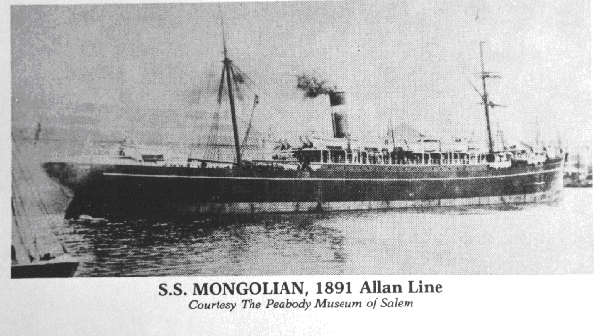

We
moved to the "Craig shack" and remained there until we left Elgin. It
had a stable and in the course of time Dad acquired a horse, a cow, and
some hens. I was in the stable one day and noticed that a hen had been
sitting in her nest for quite a while, so I stayed around, and when she
dropped her egg I saw that it had a film of moisture on it which quickly
dried.
We
had a garden and grew potatoes, onions, radishes, lettuce, etc., and of
course potato bugs. I began to have chores to do ‑ take the cow to
pasture each morning and bring her back at night to be milked. The
pasture was along a ravine which ran with water in the spring. Part of
it had apparently been a buffalo wallow, and there was a large stone
which we thought the buffalo had used for rubbing as it was very
smooth. When we had spare milk, I delivered it to customers, 5 cents
a quart, and when there was an accumulation of sour cream, butter was
made in a "dash" churn. Dad and Mother were fond of "soor dook", their
name for buttermilk. We didn't have a well and water had to be brought
from a neighbor's well. Firewood also had to be chopped and brought in.
Sometimes when mother was out visiting Aunt Mary, I made pancakes if I
could find sour milk, and the others liked them so much that they would
even bite a cake of soap to get one.
The
first automobile I can remember seemed to be just like a buggy except
that it had an engine under the seat, and a perpendicular seat in front
on which a horizontal steering wheel was mounted.
In
Elgin the Baptists held their meetings in the "Orange" Hall, and we
attended Sunday school in the Methodist church. The Methodist and
Presbyterian churches were practically back to back, and in summer when
windows were open everything was audible outside ‑ giving rise to the
story that there had been an occasion while one congregation was singing
"Will there be any stars, any stars in my crown" the other was
melodiously singing "No not one, no not one,"
The
C.N.R. excursion train to Ninette and Pelican Lake was a yearly event,
and the Sunday Schools in the villages along the line would make it the
occasion for their annual picnic. We went to Ninette one year where we
played along the beach and got wet. I wandered a bit and saw a man
inviting people to get into his launch and enjoy an outing on the lake.
I was much taken aback when the man came around collecting fares which I
knew nothing about and I didn't have a cent. He put his hands in my
armpits and made a motion as though he was going to throw me overboard,
and the other passengers seemed to be enjoying his joke.
Horses were the means of locomotion in those days, and, like kids in
later years who prided themselves on being able to name each automobile
they saw, we were able to name the breeds of horses we saw ‑ Clydes,
Percherons and Belgians being some of the heavy work horses. There were
of course lighter horses and ponies for drawing carts, buggies,
democrats, etc. The owner of a Shetland pony was a proud boy.
A
threshing outfit in a nearby field had to be visited. A team of horses
pulled the stationary steam engine and a four horse team pulled the
separator into their respective positions in the field to be threshed,
wind direction being a controlling factor. A long, wide belt conveyed
power from the engine to the separator, and when the straw being
threshed reached the lowest point in its journey through the separator,
it was deposited on an incline and dropped on the ground beyond the
separator. When a pile reached the height of the separator it was moved
away by a "buckboard", two long heavy planks boarded together with a
metal loop and singletree at each end to which a horse was hitched. The
two horses were some distance apart, but one man handled them and moved
the pile of straw alternately in each direction from the separator to
make room for more straw. We kids liked to catch hold of the buckboard
and be dragged along on it's moves, but occasionally the buckboard
wouldn't strike the pile at the right angle and would go right through
it leaving us buried in the middle. That was all right so long as the
man driving the rack to get straw to fuel the engine didn't come along
to get a load. A fireman had a steady job feeding straw into the
firebox with a straw fork which had a long metal shank and a wooden hand
grip. Another essential part of the threshing outfit was the water tank
to supply water to the engine, and it was usually equipped with a bucket
sized dipper and a long handle, or a pump with a hose to enable them to
get water from the nearest slough, or other source. At the end of the
day, the engine and separator were moved away from the piles of straw
which were set on fire.
In
later years, traction (self‑propelled) engines were used, and a "blower"
became part of the separator (a fan directing straw and chaff into an
adjustable metal spout) allowing the straw to be blown into a high
stack. The threshing outfit had to be located in each field in such a
way that the engine was up wind from the separator, and at the close of
the day the usual precautions had to be taken, as in the evening many
straw fires were reflected in the clouds.
Malcolm Alexander was born in 1906 and Annie Love in 1908. Love was
Granny Sloan's maiden name. In a small town youngsters had to devise
their own amusements. When spring came, there was an unspoken contest
to see who would be the first to come to school in bare feet, stockings
and boots being cached under the wooden sidewalk. Of course, in summer
all kids were in bare feet and by fall the soles of their feet had
become so calloused they could walk over gravel or thistles without
discomfort ‑ foot washing was a nightly necessity.
The
blacksmith shop was a magnet for it was interesting to stand in the
doorway seeing sparks flying as the blacksmith fashioned white‑hot metal
into horse shoes, or other articles, his hammer ringing as he tapped the
anvil. One might be given an opportunity to operate the bellows or
whatever device was being used to stimulate the fire in the forge.
There was the unexpected thrill when the blacksmith handed one a piece
of metal to hold for him ‑ but it was promptly dropped as it was too hot
to be held by any but a calloused hand. One wondered how he knew how
much hoof to pare away before clamping a red hot shoe against a hoof to
burn a seat for it before dipping it into water to cool it before
nailing it in place.

A horse drawn steam
engine of the period. The belt to the separator is attached to
the flywheel

The separator is being driven by the belt.
The wagon brings the grain to be threshed to the separator and the straw
is thrown out the other end. The grain is collected in the truck at
left.
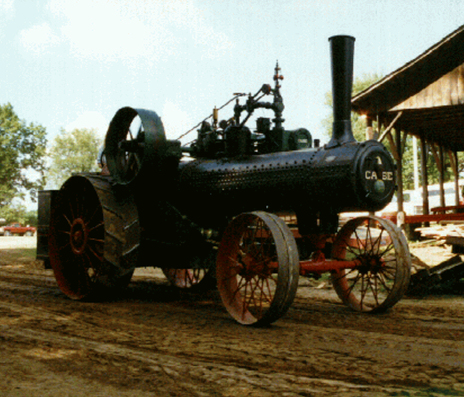
A self
propelled steam engine of later vintage (1916)
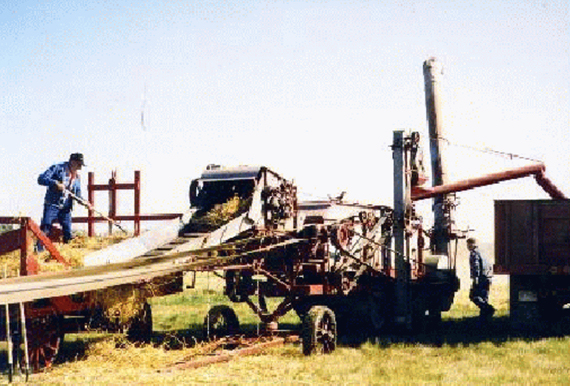
A newer type threshing machine with a blower
for disposing of the straw.
The tall pipe is the straw chute. A screw feeder sends grain to the
truck at right.
The
railway station, and it's sidetrack along which the elevators stood, was
always an attraction. Those were the days when lead seals were used
and discarded seals were always lying around, waiting for someone to
pick them up and lay them on a rail for a passing engine to flatten
them. There were usually cars standing on the sidetrack, and we enjoyed
climbing up the ladders and running along the top. The discarded
screenings at the elevators were usually left in an open bin and were
sometimes picked up to be taken home and used as chicken feed. There
was often water lying in the ditch and we made rafts using ties which
weren't in service. Sometimes we youngsters would go skinny‑dipping ‑
lads with eight or nine year old wisdom telling us "Pee down your legs
and you won't get rheumatism."
In
winter when snowfall became general, buggies gave way to cutters, wagons
to bob sleighs, and sleigh bells jingled merrily, and we would take our
hand sleighs and loop the rope through the runners of cutters or bob
sleighs we had spotted leaving town, and went with them until we met
another rig coming into town. Sometimes the drivers would whip up the
horses to give us a fast ride, or to evade us, but it was all done in
good fun, although sometimes it might be a weary walk back to town.
About
1908, Bill was the victim of a serious accident. A traction engine was
on one of the flat cars set off at the loading platform, and a number of
us were having a heyday examining it, when someone called "Here comes
the Cannonball", our name for the evening passenger train from Winnipeg
and we all headed for the station to be on the platform when the train
arrived, that being one of the highlights of the day. Some of the lads
crossed over in front of the train but I waited until it had passed,
then crossed over the track and saw Bill lying in the ditch. People on
the street had seen what happened and they were on the scene almost as
soon as me, and he was picked up and taken to the doctor's office. The
livery man dispatched a fast team to get dad who was painting a barn in
the Fairfax district. The doctor said the injury was so serious that
Bill wouldn't live the night, but as he was still alive the following
day they operated and removed fragments of the skull from his brain, the
injury being just below his crown. The C.N. sent a nurse from Winnipeg
and Bill was unconscious for two weeks and he was accommodated in the
home of the Randolph Sparrows for about two months. Some portion of his
brain was permanently damaged, and he did not get beyond Grade 3 in
school. In later life he seemed to get most enjoyment when playing with
children of the age he was when he was injured. Several weeks after he
came home, he was standing on a chair and fell off, sustaining a severe
cut on his forehead.
We had
a washing machine with a toothed bar operating back and forth across the
top of the lid agitating the dolly washing the clothes. I wasn't in the
house when it happened, but the kids managed to get the flywheel under
the tub, which gave momentum to the toothed bar, in motion and they then
vied with each other to see how close they could hold a finger to the
point where the toothed bar engaged the dolly. Malcolm Alexander got
into the competition, but didn't get his finger away in time and it was
caught and squeezed. Fortunately only flesh was involved.
Dad
had carried on his religious work throughout the years, and in addition
to painting he had done some preaching. On one occasion he went to
Otturburne, a village south of Winnipeg to speak to a Baptist
congregation, but concluded the place wasn't for him because it was an
R.C. community and the people spoke French rather than English.
Mother
was a homey person, industrious and frugal (of necessity) and on one
occasion she and Aunt Mary made soap using lye and other ingredients.
In Dad's absences, I became very close to her. She baked bread for the
family preparing the dough with potato water and yeast, leaving the
dough in a large pan, warmly wrapped, to "rise" overnight. The
following day she would knead the dough and put it in pans to be baked.
The "heel" of a freshly baked loaf was coveted. She baked scones which
I now know as baking powder biscuits, and they were broken open when hot
and eaten while the butter was melting after being fortified with a
dash of pepper. Currant and custard pies were also favorites, and
another delicacy was canned rhubarb, a piece of ginger root being
inserted into the seals as they were being closed.
Nineteen ten was an eventful year. Dad had spent the previous winter
preaching at Marquis, Keeler and Brownlee, northwest of Moose Jaw
(probably for the Presbyterians). King Edward VII died, and Halley's
comet could be seen each evening as it travelled across the western
sky. The earth was to pass through the tail of the comet one night and
I stayed up to see what happened. I might as well have gone to sleep.
Dad
and I attended a memorial service for King Edward in the "English"
church. It was the first time I had been in such an edifice, and during
the course of the service I braced my feet against something, and
stretched, when the kneeling bench tipped over with a terrifying crash
right in the middle of the solemn service.
Dad
was invited to take charge of a Baptist congregation in Glen Ewen,
Sask., and we moved there that fall, and we were there when King George
V was crowned in 1911. Before leaving Elgin, dad took me with him when
he went to pick up "Madge", a balky horse he owned. On the way home I
drove and dad held Madge's lead rope. She suddenly stopped and Dad's
hands automatically closed on the rope which burned through his hands
before I could bring the buggy to a quick stop.
Dad
went on ahead to Glen Ewen, and to get there it was necessary for mother
and the family to drive fourteen miles to Hartney to catch the C.P.R.
train. Mother also hand baggage and five youngsters to look after, and
shortly before the train was due to arrive at Hartney, she couldn't find
her handbag which contained our tickets, etc., Everybody assisted in a
frantic search for it, but it couldn't be found. The station agent got
in touch with Glen Ewen, and was assured that the conductor would carry
us to Glen Ewen without tickets, and Glen Ewen would get the fares. A
couple of weeks after we got to Glen Ewen word was received that
mother's handbag, with it's contents intact, had been found in the "wee
hoose" at Hartney where she had laid it in a dark corner, such
facilities having little illumination.
At
Glen Ewen in 1911, John Moffat was born (Grace Moffat had been mother's
dear friend in Scotland). I well remember the morning. Facilities in
the house were limited, and the first thing in the morning was to use
the facilities in the washstand in our parent's room. That morning I
went to go in there when the door was slammed in my face so sharply that
I was thrown against the opposite wall.
Houses
in those days were heated by a stove or range with a high "warming
oven", and auxiliary heaters might be in other rooms. A "reservoir"
adjacent to the oven was kept well replenished, the water being warmed
by it's proximity to the fire. The stoves were usually fired by wood in
summer and "Galt" coal in winter, and the stovepipes conveyed the smoke
to the chimney adding a measure of heat to the rooms through which they
passed..
In
rural homes basements as such were unknown, but there was usually a
cellar, a shallow pit entered through a trap door in the kitchen floor.
I remember a home near Elgin where they had a "cooler" in the cellar ‑
they pulled up a section of the floor and it had several shelves
attached to it, counter weights having made it easier to pull up or
lower.
One
day, at Glen Ewen, the trap door had been left open and Annie
disappeared into it, but as the door slammed shut a small piece of
Bella's skirt was caught and held her in mid air, howling. As it was
impossible to get a grip on the small piece of cloth, and as she
wouldn't have much farther to fall if the door was opened, it was
decided that was what had to be done. Annie was badly scared but was
otherwise uninjured.
But
that wasn't the only mishap that occurred at Glen Ewen ‑ Malcolm wasn't
going to school and often accompanied the drayman on his deliveries. On
one occasion the team decided they wouldn't wait for the driver to
return and they took off at full gallop around the village, then
decided to head for the livery barn where the dray jammed in the
doorway. Malcolm (by that time we were calling him "Mack" because Dad's
pronunciation of "Malcolm" sounded like ("Mah‑cum"), got a bit of a
scare from the wildest ride of his young life.
When I
started school in the fifth grade that year, I found we hadn't been
taught "Grammar" in Manitoba, and I had a bit of catching up to do.
They also had the "old red" Canadian history book, and just then "The
Prairie Provinces" became a text book.
During the holidays in 1911, I visited a farm in the Souris Valley where
they were haying. They drove the hayrack right into the loft, and
pitched hay to me which I spread around. By the second day I was pretty
homesick, but had discovered the relief a cold wash gave after a sweaty
morning's work. They had an automobile with headlights lit by gas
developed in a generator fastened to the running board. When I got home
I rushed to mother, threw my arms around her and she gave me a bear hug.
As
was the case in most prairie towns, a dependable water supply was a
constant problem, and that summer they were drilling for water, the
outfit consisting of a steam boiler which developed steam carried along
a bare metal pipe for a number of feet before it reached the steam
drill. One day Bill and I went to see how they worked. In walking
toward the drill, Bill sort of lost his balance and grabbed the
unprotected steam pipe getting his hand badly burned,
Dad
had a Sunday morning service in Glen Ewen. He had a clear strong voice
and led in the singing. Sometimes now when I hear some of the old songs
which were in the "Moody and Sankey" hymn book, I seem to hear his voice
joining in. After lunch on Sunday, he drove some thirty miles to
Newport, North Dakota, where he conducted an evening service, staying
there overnight and returning to Glen Ewen on Monday. In winter after
the long drive, he would come into the house tugging the icicles off his
moustache, and it was our duty to extinguish the charcoal "brick" which
was the source of heat in the "foot warmer."
One
spring day on the way home from school, I passed a small pond and near
it's edge I saw a snake with a frog in it's mouth ‑ so I made it a dual
execution (according to schoolboy lore a snake's tail wouldn't stop
twitching until after sundown). Kingbirds used to nest around the same
pond and if anyone approached the nest they set up an agitated racket,
in fact if one got too close to the nest they would "divebomb" and
strike one on the head.
While
in Glen Ewen I attended my first political meeting. That was the year
of the "Reciprocity Election" ‑ free trade with the U.S. ‑ which was
defeated. I am inclined to believe that if it had gone through, Western
Canada, through self‑interest, might have become an integral part of the
U.S.A. such a proposal having come to the front this year (1980) from
several Saskatchewan politicians who have financial interests in the
U.S.
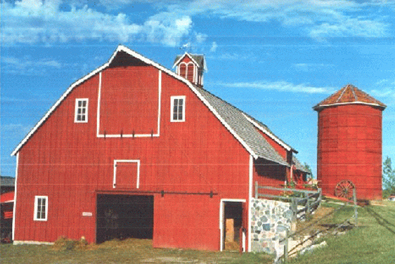
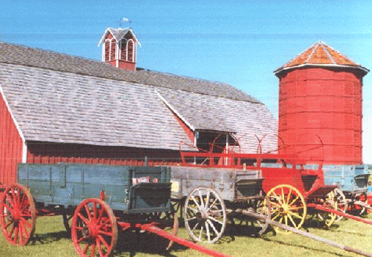
Pictures of
barn showing access by wagons to the loft.
In 1911
we moved to Newport, and while there dad was ordained as a Baptist
minister, and he acquired an "Oliver" typewriter, and a set of books
"The New International Encyclopedia" which I have ‑ can you imagine an
encyclopedia that doesn't make mention of aeroplanes We kept in touch
with Canadian affairs by subscribing to the Manitoba Free Press, one of
the news stories of that year (1912) telling of the breaking of the ice
bridge below Niagara Falls when several lives were lost.
At
Newport it was obvious there had been a great improvement in farming
operations ‑ big steam traction engines were replacing horses in many
areas, particularly in plowing. I recall seeing a big J. I. Case
tractor pulling a gang‑plow turning over twelve furrows at a time. They
didn't have to worry about leaving a headland ‑ it was virgin prairie
and there were no fences.
In
1912 we moved to Elk Point, South Dakota. One of the prized possessions
brought from Scotland was a large oval mirror and stand made of reddish
wood with a felt lined compartment for jewelry. (also brought from
Scotland were two pairs of brass candle sticks which Granny Sloan had
given to mother, and on arrival in Elgin mother gave Aunt Mary a choice
and she took the big pair ‑ I now have the small pair.) On the way from
Newport, by rail from Kenmare, N.D., to Minneapolis, Minn., by Soo line,
and then via Aberdeen, S.D., to Elk Point on the Milwaukee line, it was
my duty to take care of the mirror and I kept it in my charge until a
bed was assembled and bedclothes were spread out. I laid it face down
on the bed. Someone sat on the edge of the bed and the mirror slipped
and landed on the floor cracking it all the way across the middle.
In
the bustle of arranging furniture, etc., in a new home, Annie
disappeared. We searched the neighborhood without success, and mother
and dad were frantic about her being about in a strange place, when she
showed up ‑ she had been asleep in a small closet under a stairway in
the house, an out of the way place we hadn't noticed.
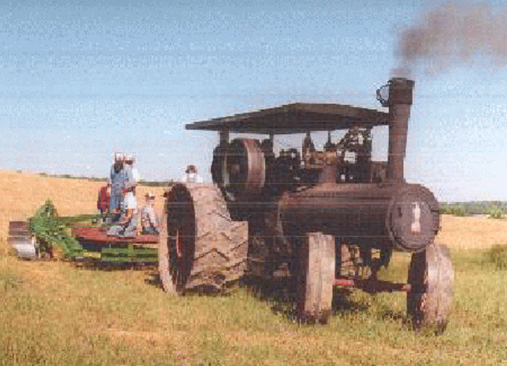
Case steam
traction engine with plough.
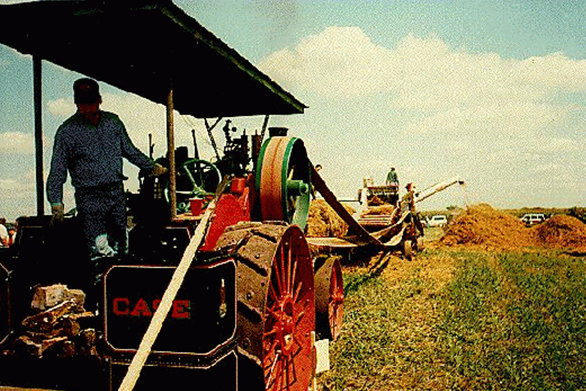
Case steam
traction engine on a threshing machine.
At
Elk Point we learned that corncobs were useful in a region where Eaton's
catalogues were unknown. I got a job in a nearby grocery store as an
errand boy ‑ have you ever been sent to locate a left handed monkey
wrench which had been loaned to another store? In school spelling bees
were a Friday afternoon event, and it was quite a thrill to spell a word
which the preceding scholar had missed, and moving up the line ahead of
those who missed it, and this procedure was followed until the head of
the line was reached, or the period ended, the person at the head of the
line when the period ended taking his place at the bottom of the line
the next time it was assembled.
But
tragedy struck in September, 1913 ‑ at the birth of her seventh child
there were complications, the baby was lost and mother was confined to
her bed. Every day when I came home from school I would go into her
bedroom, squat down on the floor and tell her what had occurred. One
evening after I had been in bed some time, I heard the telephone bell
ring, and a little later I heard someone come in. After a while dad
left the house, and I went downstairs where I saw the doctor, and he
sorrowfully shook his head. Mother's face was twitching and I leaned
over and kissed her, (she had succumbed, to an embolism (?) perhaps).
She was buried in Elk Point cemetery.
Dad
was left with six children ‑ fortunately help came from Mr. and Mrs.
Joel Webber, members of the church who had a farm a few miles out in the
country. They took Malcolm, Annie and Moffat. By this time Annie had
become known as "Dollie". One day Dad had been reading a story about
dolls to her and when he finished, she said to him "I'm your dollie,
aren't I, daddy?" Bill and Bella went to the Oddfellows Orphanage at
Dell Rapids (Dad had been a member of the Elk Point lodge), and I went
to Sioux Falls to stay with Mr. and Mrs. Earl Pitcher (Mrs. Pitcher and
Mrs. Webber being sisters), Dad having arranged for me to attend Sioux
College which was under the auspices of the Baptists I had just
commenced my freshman year in Elk Point High School, and carried on in
that year at Sioux Falls. For pocket money I got a job delivering
papers on a route for the "Sioux Falls Herald". Just as I started the
route they commenced carrier collections, and they gave us 10% for
collecting outstanding subscriptions. The first week I collected over
$100 and the lad who had the route before me tried to get me to share it
with him, I told him he had been paid for his deliveries and he hadn't
assisted me in making collections, so I refused to share what I had
received.
When
Sioux Falls College year ended in the summer of 1914, I went to Sioux
City, Iowa, to join Dad, and I got a job in the packing room of a
wholesale grocery warehouse at $6.00 a week. After paying my board and
room where Dad lived, daily streetcar fares and lunches (soup, meat,
vegetables, pie and coffee $0.15) I had $0.95 for spending money and
Sunday collection.
Some
months earlier, Malcolm went to live with Judge and Mrs. J. L. Kennedy
in Sioux City, there being a family connection with the Webbers, and the
Kennedy's wanted a companion for their only son, Lloyd, who was
Malcolm's age.
When
school resumed that fall, I moved over to the Kennedy home (Mrs. Kennedy
had died in the meantime) where I looked after two riding horses and a
pony, and I attended Sioux City High School, taking Grade X.
The
Kennedys had been building a house in "The Heights" a new development,
and when it was completed that fall, we moved into it and the Judge
hired a housekeeper. Saturday afternoons, the two boys and I attended
the Orpheum Theatre, a vaudeville house. On one occasion, we were
sitting in a box seat, and one of the entertainers was a very good
violinist, and he would invite members of the audience to say something,
and he would imitate it on the violin. I don't recall how it happened,
but I had a siren whistle in my pocket, and at at opportune moment I
blew it. That brought the house down, even the violinist laughed.
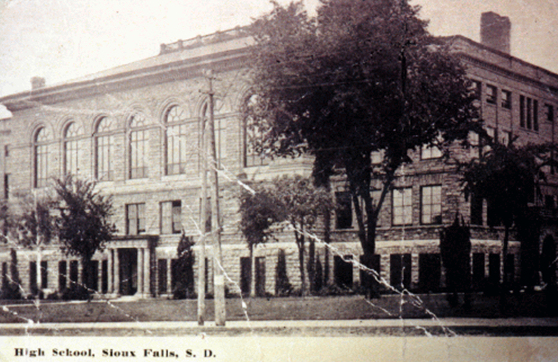
Sioux High
School, Sioux Falls, South Dakota.
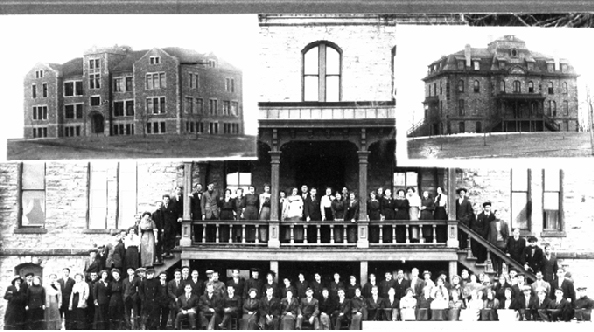
Sioux Falls
College and some of the students.

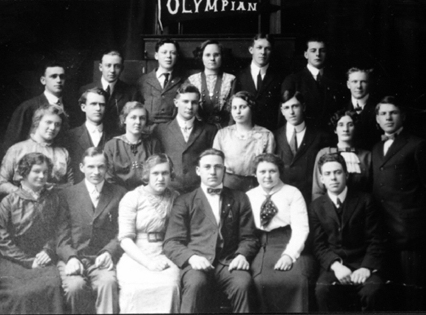
Top
students (TMS under the ‘O’).
After
New Year's Day, 1915, the Judge and the two boys, with a colored
chauffeur who looked after the boys, went to California, and I was left
to shovel snow, coal, ashes, and to look after and exercise the two
riding horses and the pony, and I attended Sioux City Business College.
After being away for some weeks, the travelers returned, and the Judge
saddled his horse and went for a ride. When I got home the Judge told
me of his ride, and complained that I hadn't been looking after the
harness as the saddles and bridles I hadn't been using had a green
coating. (The stable was below the garage and was built into the side
of a hill. In the winter time, the door being closed, the atmosphere in
the stable was moist due to the presence of the animals.) I hadn't had
any instruction in the care of the harness, and I didn't like the
criticism, so on a Monday I took off for Winnipeg. The war had been on
for six months or so.
I kept
out of sight when the train stopped at Sheldon, Iowa, (Dad was there
then) and it was evening when it got to Minneapolis. I thought I might
stay in the station until the Winnipeg train left in the morning, but at
midnight I was turned out. I wandered along Hennepin Avenue for a
while, then decided to go into an upstairs hotel where the rates seemed
reasonable. The clerk showed me to a room, then asked if I wanted some
beer. When I declined, he asked if I wanted a woman and I refused. A
little later I heard him telling a woman in the hall about me.
The
next morning I boarded the train for Winnipeg, and on arrival at the
border that afternoon I was interrogated by the Immigration officer and
admitted I had only $5.00 in my possession. He seemed hesitant about
admitting me but a farmer seated nearby heard the conversation, and he
said he would give me a job on his farm which satisfied the Immigration
officer and he allowed me to proceed. After the train left Emerson the
farmer said, "OK kid, go where you want to."
After
arriving in Winnipeg, I visited the recruiting offices of the Winnipeg
Rifles, the Grenadiers, and the Cameron Highlanders which were on Main
Street near the C.N. station. While making these visits I met up with
several fellows who had the same purpose in mind. When we found these
regiments were not recruiting that day, we went to Portage & Sherbrook
where the Artillery had their office, with the same result, so we went
on to Minto Armories where the 44th Battalion was recruiting . I didn't
pass the medical when my eyes were tested.
One of
the fellows I had met told me not to worry but to come with him and he
would get me a job on a farm. The next day we took a train to Myrtle,
Man., and I got a job at $12 a month, to be increased to $20 when the
summer work started, but in the meantime there were the usual farm
chores to be done.
The
farmer stipulated that I must get in touch with my father, and I did.
Years later I learned that Judge Kennedy had got in touch with dad
several days after I left, and started to give him heck because he
hadn't notified the Judge I was with him. Dad, of course, told the
Judge that he hadn't the faintest notion where I might be. When summer
work started I was given charge of a four‑horse outfit and harrowing,
ploughing, and drove a binder when harvest was on.

Carman
Detachment 222nd O.S. Battalion (on a postcard to Father).
TMS 4th row 2nd from right.
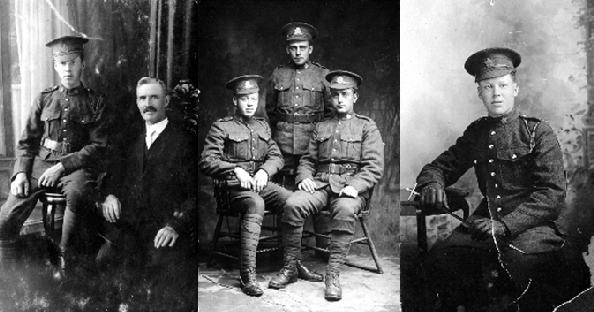
Left. Father and
I (about age 16). Centre: With two friends. Right:
Private Sutherland.
When
threshing commenced, I drove a grain wagon. As the threshing outfit was
moved a couple of times a day, it was necessary to "throw" the belt
which was then rolled up and stowed on the separator. On one occasion,
I took the notion that I would "throw" the belt, so I went over to it,
reached over and took hold of it when it was jerked out of my hand and I
went several feet before I could recover my balance. I tried again with
a like result. The engine was slowing down and I was near it's front
wheels and I determined that this time I was going to succeed and I took
a firm grip of the belt and was yanked off my feet and my arm shot up
between the belt and the flywheel and I was thrown against the big wheel
and my arm came free. I took several steps and the engine man asked me
how I was and I said "OK" and fell over in a faint. I was very lucky to
have escaped injury when my arm was caught between the belt and the
flywheel, as many persons had lost arms or been seriously injured in
similar occurrences. When I got up they showed me what I should have
done ‑ instead of catching hold of the belt, I should have put my arm
over it and bent it into a perpendicular position as it slipped by my
fore arm, and then pulled it toward me and it would run off the
flywheel.
In
the fall of 1915, I went to work for another farmer and when the first
farmer was paying me off he asserted that I had failed to skim the froth
off a pail of milk before giving it to the calf, and it had bloated up
and died several days after.
The
pay at the second farm was $10 a month during the winter, including
board and room, and I was to do chores, feed the animals, clean the
barns, etc., and the first job I was given to do was to attack an
accummulation of several years' manure, load it on to a spreader and
empty it on a nearby field ‑ that took several weeks. In February two
brothers with whom I was friendly, and I were in Roland, Man., when we
learned they were recruiting for a southern Manitoba battalion, so we
enlisted and were posted to the Carman detachment. When I told the
farmer we had enlisted, he agreed to let me go, but as he had to pay my
replacement $12 a month, he deducted from the money coming to me enough
to ensure that his costs for the winter help did not exceed $10 a month.
We
went into training at Carman, there being detachments at numerous
southern Manitoba towns, and when Camp Hughes opened that summer, a
special train called at the various points where detachments were in
training and took us to Camp Hughes where the 222nd Battalion was
assembled for the first time. Dad came up to Camp Hughes to see about
getting me out of the army as I was under age. I was paraded before Lt.
Col. Lightfoot who said he would give me a discharge if I wanted it, and
I told him I had enlisted in the army and wanted to stay, so Dad decided
to stay in Winnipeg where he became the pastor of the West Kildonan
Baptist Church.
Our
battalion was the last to leave Camp Hughes in the fall of 1916. There
had been over 40,000 of us in training there that year, all under
canvas. In the late fall, the tents were cold, so many of them became
heated by "coal oil" heaters, the occupants of a tent contributing to
pay for the heater and oil. After a cold night it wasn't unusual to see
grimy, even black faces in the morning indicating that the wick of the
heater had been turned up too high resulting in poor combustion causing
soot. When snow came, we were moved into the empty theatres.
We
went overseas on the S.S. "Olympic" in November, and went into camp at
Shoreham, Sussex, and within a few weeks may of the men went to France
where they reinforced the 1st C.M.R.s and the 44th Battalion. On Dec.
31st, those left in the 222nd marched to Seaford where we were
amalgamated with the remnants of the 196th (University) Battalion, to
form the 19th Reserve. In that Reserve there were quite a few under 19.
For service in France, we were moved to Witley to join the 128th, Moose
Jaw Battalion, in the organization of the "Fighting Fifth" Division but
as casualties were severe in France in the spring of 1917, the division
was broken up to supply reinforcements, and some of us found ourselves
in the Saskatchewan Regimental Reserve, where we became acquainted with
many men who had served in the 46th Battalion and were awaiting return
to that unit after discharge from hospital in England. The authorities
decided to gather all the under age troops into a Young Soldiers
Battalion, and we were sent to Bexhill, near Hastings, for training as
there was a special school there. At Bexhill we were again under
canvas, and after Reveille we were assembled, clad in greatcoats only,
and marched to Cooden Beach nearby to bathe in the English Channel in
the nude. Some local residents complained, and I understand the area
commandant, Brig.‑Gen. Critchel had an item in the local paper
commending the complainants on the quality of their field glasses
enabling them to discern anything which might be a cause for complaint.
We
returned to Bramshot that fall and were used on many occasions to
demonstrate to fresh arrivals from Canada how a smart unit performed
their drills. On one occasion we marched past King George V at one
hundred and sixty to the minute, our bugles were silent but the drummers
really went to town.
Speaking of bugles, they were rarely silent for long between "Reveille"
and "Lights Out" occasionally we heard "Long Reveille " but it was
usually the "Rouse', "Get out of bed, get out of bed" or the American "I
can't get 'em up, I can't get 'em up" and the buglers seemed to have
calls for everything. Each call was preceded by a few notes identifying
the unit making the call. After reveille they followed in quick
succession, "Sick" parade, cookhouse "Come and get it", "Come to the
cookhouse door" or "Pick ':em up, pick 'em up, hot potatoes", the half
hour dress, the quarter dress, the fall in, the "Come along," all having
to do with parades, the mail call "There's a letter from Lou", the
officers mess call "The officers wives get pudding and pies but we poor
beggars get skelly." The Orderly Room call for those who had to answer
for some transgression. "Retreat" at the end of the afternoon was a
formal call when everyone had to cease what he was doing and stand at
"Attention" while the flag was being lowered. Then there was the
"defaulters" call when those who had been "confined to barracks" had to
report to the guardroom every half hour for roll call.
At
Camp Hughes we had no trouble knowing when reveille would soon be
sounded as the next lines to ours was occupied by the 107th Batt. "Glen
Campbell's Scouts" many of them were Indian or of Indian extraction, and
their pipe band was out every morning tuning up their bagpipes or
tightening up their drums preparing to march through their lines with
pipes and drums playing as soon as reveille was sounded.
If we
happened to be near the cavalry or artillery units, the trumpet calls
were a contrast to the bugle calls. There was no mistaking "All who
are able, come down to the stable, and feed your horses and gallop away"
.
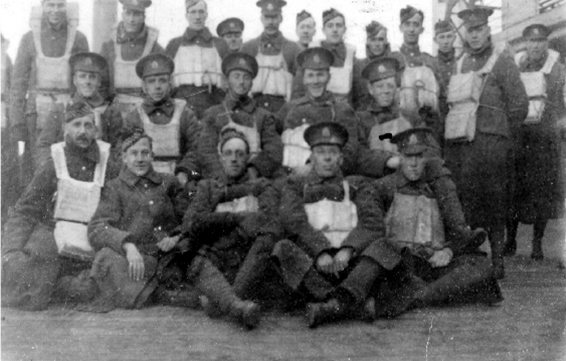
On board
ship. TMS middle row, right end.

Another
view of the ship.
One day
while we were at Bramshott, the Y.S.B. sent a detachment by train to
Aldershot where thousands of troops had been assembled to witness the
awards of valor, to those who had earned them, by His Majesty King
George V and Queen Mary. After some hours we boarded a train at
Aldershot, and had to change trains at Wigan(?) to catch one going in
the opposite direction. We boarded that train getting into the last
coach. When it stopped we found we were back in Aldershot ‑ the last
coach on the train we boarded was a "slip" coach which had been detached
from the train while in motion, switched on to the Aldershot line in
charge of a "Guard". It was rather late when we got back to Bramshott.
While
in England, I took the opportunity to visit Aunt Annie in Eccles (I
arrived at her home before the telegram, had been delivered, telling her
I was coming), and then went on to Howwood to visit Aunt Flora and her
family, finding her son Archie home on leave. I also visited the Easons
(I understand they later went to the antipodes). Then on to Dundee
where I arrived late in the evening and booked in at the Lamb's Hotel.
The following morning I made enquiry for Uncle Malcolm, finding him on
duty at the hotel. Nothing would do but that I should book out of the
hotel and go to his home. His eldest daughter Bella, a Territorial
nurse, was home on leave, and Katie was still at home. I also met two
of Dad's brothers and members of their families, one being the General
Foreman at the North British Railways Goods station, and the other had a
shop in Lochee, a suburb of Dundee.
Most
of us in the Y.S.B. were returned to our respective depots or reserves
towards the end of summer in 1918, and were sent to France. The group
from the Saskatchewan Regimental Reserve were sent to France to
reinforce the 46th Battalion, but after arrival at a staging station
there was a parade and we were informed volunteers were required for the
16th Batt. and volunteers were asked to step forward. We hadn't had any
contact with the 16th, and as we wished to stay together, none of our
group stepped forward, with the result that as many as were wanted were
counted off and detailed to go to that unit. As soon as that parade was
dismissed, we got together and decided as that was the way things went,
if another parade was called and volunteers were required, we would have
to step forward if we wanted to stay together. An hour or so later,
another parade was assembled and volunteers were asked for the 78th
Battalion, and our group stepped forward as one and we eventually joined
the 78th near Arras. On our way up from the staging area we travelled
in box cars marked "8 Cheveau 40 Hommes". Further progress was made on
foot and it seemed that we recognized and exchanged greetings with
someone in every unit we passed, having served with them in England.
The
first night we were bivouacked in an abandoned sugar factory and we
slept on stone floors, exchanging our rations which we had brought with
us. The next night we spent in what had been the cellar of a house, and
when I wakened in the morning I found I was looking up at the sky
through the chimney of a cellar fireplace. We were a short distance in
front and to the right of an artillery battery. We could see the flash
as the No.1 gun was fired, and as the No. 2 flashed, we heard the sound
of the discharge of the No.1 gun, and so all four guns followed each
other in that sequence.
As it
was getting along into the afternoon, I looked around to find something
to eat, and I started a fire in a small firebox adjacent to the house,
but as I stooped down, a blast of fire came out and engulfed me, burning
my face and hand and ruining my uniform. I was taken to the First Aid
station where my hands were bandaged and a dressing was put over my
face, holes having been cut for my eyes and mouth. I was dispatched to
a Casualty Clearing Station to be taken to hospital. While in the
C.C.S. they gave some lunch, and another casualty was asked to feed me.
He had some difficulty in finding my mouth through the hole in the
dressing, and just as he found it, he had to go places in a hurry ‑ he
was suffering from dysentery, and I didn't keep track of how often he
left me before I decided I didn't want any more. Late that evening, I
was taken to a hospital near St. Pol, but it was about 2 a.m. before I
finally reached the ward I was assigned to. Then as the beds came in
sight, I passed out, and they must have undressed me and put me to bed.
I was there about a week or so, finding it embarrassing to have to get
someone to do personal things for me. The dressing was taken off my
face, and if my face turned sideways the pillow slip or sheet stuck to
me, so I mostly lay on my back with my hands above my head.
In due
course I was evacuated to England, but the Channel crossing was very
rough and I had to walk with my elbows extended to combat the rocking of
the ship, then on the train as it went to Birkenhead and a hospital at
Thornton Hough, Lord Leverhume's estate. As I couldn't do anything for
myself, I stayed in bed reading, turning pages with my tongue, and being
fed by a nurse . In course of time my burns healed, but the first day
my hands were without dressings as I started to shuffle a pack of cards
blood blisters were raised on the palms of my hands. Being in "hospital
blues", blue trousers and jacket, white shirt and red tie, we were
allowed to travel on the ferries between Birkenhead and Liverpool, and
on the Liverpool "trams" without charge.
In the
course of time, I went to convalescent camp at "Bearwood", someone
else's estate, and one morning we were routed out of bed to go on parade
at 6 a.m. on a cold wet day. We were informed that at 11 a.m., that
day, November 11th, 1918, an armistice was coming into effect to end the
war. A few days later, those of us at Bearwood, and from other
convalescent camps found ourselves at Kimnel Park, near Rhyl in north
Wales awaiting transportation home. As most of us had quite a bit of
service, and were awaiting back pay and the leave usually given on
discharge from hospital, we weren't happy about it, and after a
demonstration at Headquarters, we were sent to our respective Reserves,
in my case the 11th, after being paid. I made my last visit to Eccles,
Howwood and Dundee, and returned to Canada on the S.S. "Baltic" in
February and was finally discharged at McGregor Barracks in Winnipeg,
Mar. 21, 1919.
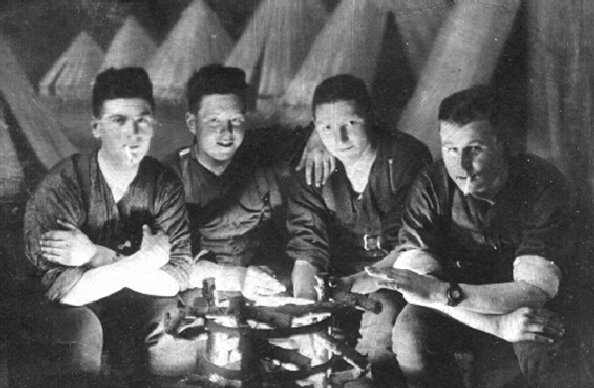
Scene from
camp showing Bell tents in background. TMS 2nd from left.

A number of
post card scenes from Witley Camp in England

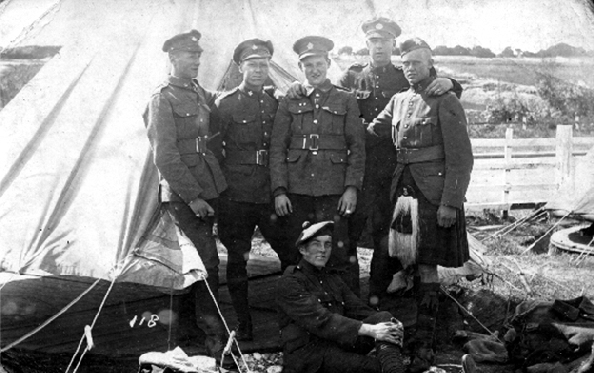
A few
fellows from camp. TMS 2nd from left. This is the front of
another post card.
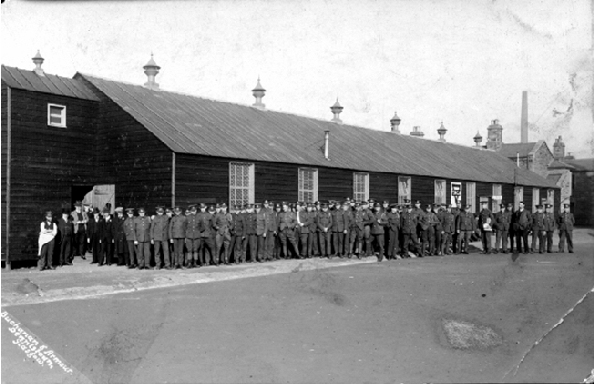
This is
another post card stamped ‘Y.M.C.A. Institute, Maryhill Barracks
Glasgow’.
Dad
was then living in Thelmo Mansions on Burnell St., and had Bill, Bella
and Malcolm with him, as well as a housekeeper and her two children.
Shortly after my return and while wearing uniform, I went to Elk Point
where Dollie and Moffat were living with the Webbers, and brought them
to Winnipeg. Shortly afterwards we were asked to leave the Thelmo as
there were too many of us in the suite, so the Sutherlands moved to 742
St. Mathews Ave. During the summer the youngsters went out to Elgin to
visit Aunt Mary, and while there the whole family was quarantined
because of measles .
One
day Dad decided to make bread the way mother had done it. Several weeks
later I was in the basement checking the furnace and I saw a chunk of
coal on top of some trunks. I took it down and found it apparently was
a loaf of bread burned black as tar. I showed it to Dad and he admitted
that he had forgotten that the bread was baking and it had been badly
burned. We scraped away the charring and found the bread quite
palatable, but Dad didn't try to bake bread again.
Some
time after their trip to California, Judge Kennedy and the two boys went
on a trip to Yellowstone or Glacier National Park during which they did
a lot of horseback riding. Malcolm's horse was named "Buck" and it
seemed that Malcolm was urging or reproving him so often that the people
on the tour party began to call him "Buck", and that name stayed with
him. Some time later at Sioux City, Buck fell or was thrown off a horse
and his foot stuck in the stirrup and he was dragged along the ground,
and one of the horse's hooves struck him in the face.
After
being discharged from the army, I took a course at Success Business
College, and in the fall I got a job in the office of the Winnipeg City
Electrician,
In
1921, Dad married Jessie Gardner (five years my senior), and in 1922
Frank Mathieson arrived on the scene. We then moved to 553 Maryland,
where we had more room. After Isabel finished school, she enrolled for
training in Victoria General Hospital. When Buck finished, he got
casual work in Eatons.
In
1922, having become dissatisfied with the situation in the City
Electrician's office, I resigned and took up employment with the Dept.
of Investigation of the C.P.R.
When
Dollie finished school, there seemed to be some discussion about what
she should do, and I got the impression Dad and Jessie seemed to be
satisfied if she could find work as a domestic. I didn't like that, so
Buck, Dollie and I moved out and went into a small suite in the Wardlaw
Apts., on Osborne St. I arranged for Dollie to take a course at the
Success College, and enrolled Buck in a night school course in railroad
telegraphy, but I learned afterward he missed as many classes as he
attended. I also provided pocket money for Isabel as nurses in training
were not recompensed.
In
1927 there was a Royal Tour across Canada by the Prince of Wales and the
Duke of York, and their staffs, and Prime Minister Stanley Baldwin and
his wife with their staffs. The tour was routed over the C.P.R.. and
our Chief, Brig. Gen. E. de B. Panet was appointed the official
representative of the Federal Government, and of the C.P.R. on the tour,
and I was selected to handle the secretarial duties. With Gen. Panet.
I boarded the R.M.S. "Empress of Australia" at Father Point in the Gulf
Or St. Lawrence, disembarking at Quebec City. From Quebec, we travelled
to Montreal up river on the Canada Steamship Lines S.S. St. Lawrence
with the other members of the C.P.R. party. Asst. to the Chief S. H.
Spry and three Investigators joined us for the rest of the tour. We
were tipped off that one of the American press correspondents had made a
bet that he would get an "exclusive" interview with H.R.H. on the trip.
The opportunity seemed to be opening up as the Princes stood admiring
the evening skyline as we neared Montreal, but the members of our party
closed him off, apologizing as we stepped on his toes. The tour
proceeded across Canada, the Baldwin party being disengaged at Banff for
their return, while we continued on to Victoria and wound up at Quebec
City.
As I
wasn't flush with money when I left Winnipeg, I hoped that Buck's wages
might pay for the groceries while I was away. On my return I was told
that there had been a water leak in the bathroom, and water had leaked
through the floor and the storekeeper downstairs had complained of
damage, and the leak had occurred when Buck leaned against the basin in
the bathroom, A day or so after I returned I answered a knock at the
door, and when I answered found it was the woman from the store
downstairs, who asked when her bill was going to be paid. I called
Dollie and learned that they had to charge for food they needed while I
was away, and I assured the woman that she would be paid without loss of
time. There was also some comment about the water damage, and I told
her it had occurred because of the poor condition of the plumbing and
the floor, matters I thought she should take up with the landlord. Many
months afterward I was told the damage had occurred when Buck stood on
the bathroom basin while he replaced a bulb in the ceiling light.
Shortly after the Wardlaw incident, we moved to the Highworth Apts., a
little further south on Osborne St. By this time Isabel had finished
her training at the Victoria and she moved in with us. Moffat also came
in, and after some negotiation he was started in school as an dependent
of mine. About this time Buck got a job as a cache‑keeper on the
Hudson's Bay line. When summer holidays came along, Moffat returned to
Dad. In the fall of 1927, with Isabel and Dollie, I moved to the Asa
Court at Langside & Broadway.
For
some years, I had been involved with snowshoe clubs and the Manitoba
Snowshoe Union, and I had become acquainted with Margaret Hughes who had
similar interests. We had often met at meetings and outings. One day I
asked her if she would take me to a Scottish show which was running at
the Walker Theatre. She said she would, and that was our first date. I
got tickets, met her, and we had a very pleasant evening. The Royal
Tour then intervened and we did not have another date for quite some
time. We met again at a New Year' s dance, and I had so many dances
with her that the chap she came with asked me if I was going to take her
home. We had various dates in January and by Valentine's Day she had
accepted my proposal and we were married on February 28th, 1928. We
were one of a group of eight couples who had been associated more or
less with snowshoe affairs for years, and with the assistance of one of
the couples we arranged that the others would be invited to a surprise
Party at the home where we were being married.
When we
were in a bedroom having a libation, one of the fellows said "Tom, you
don't seem very surprised to see us." "No," I replied, "Margaret and I
are going to be married tonight." There was a loud guffaw, and he said,
"Well, I'll call your bluff. Show us the marriage certificate." His
jaw dropped with surprise when I produced it.
We had
arranged for Dad to come into town and conduct the ceremony, which he
did. We were in a private home, and the owners had a Boston terrier
known as "Petey". When the soloist was singing "I love you truly,"
Petey joined in with his harmony. A little later Margaret and I managed
to slip away unnoticed, and we went to a nearby drugstore where I called
a taxi to take us to the Royal Alexandra Hotel where I had arranged for
a room with the proviso that our names would not be given to the
telephone operator. We were later told that when our absence was noted,
the fellows made frantic calls all over trying to locate us, without
success.
Margaret had been sharing a suite with two of her sisters, Birdie and
Hazel. and our marriage, of course, upset that arrangement. Dollie and
Isabel found other accommodation. Margaret sold a car she had, and we
began looking for a house and when our lease at Asa Court expired, we
moved to 537 Stiles St., which we had arranged to purchase. As we had
ample room there, Dollie moved in with us.
That
fall I was informed that I wag going to be appointed as an Acting
Investigator at the beginning of the year, with a sizeable increase in
salary, so we thought we were quite established when the promotion
materialized.
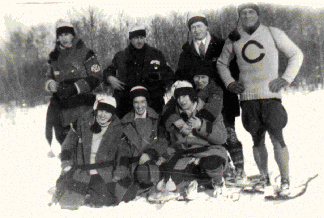
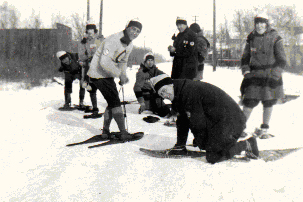
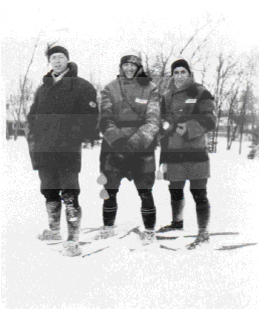
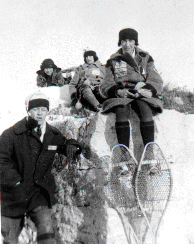
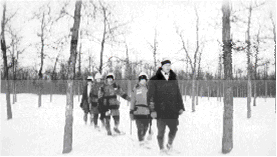
Pictures of TMS
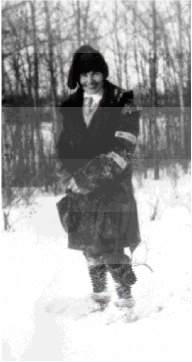
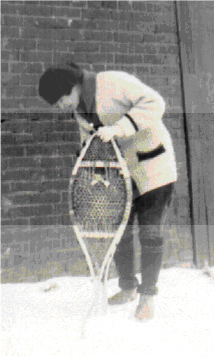
A couple of
shots of Margaret Hughes
My
first assignment was to be on duty at the Royal Alexandra Hotel for the
New Year's Ball, which gave rise to the rumor that Margaret and I
weren't hitting it off as I had been at the Royal Alexandra Ball without
Margaret. One day when I came home for lunch, Dollie was there and
she wanted to see my handcuffs, and she learned their use by putting
them on her wrists. I went through the motions of looking for the key,
and said I couldn't find it and would have to go to the office for it.
Dollie was very much put out, and I left the house and crossed the
street as though I was going to the streetcar stop, but a few minutes
later I returned and relieved her distress by saying I had found the key
in another pocket.
Early
in 1930 we thought things were coming up rosy ‑ Margaret was going to
reveal her secret about the end of September, then in July I was told
that I was being transferred to Lethbridge in August. By explaining our
predicament and that Margaret was reluctant to change doctors, I got the
transfer postponed until November. Thomas Hughes arrived on September
27th, 1930 and my sister Mary Lou at Carnduff in July, 1931.
Buck
had returned to Winnipeg in the spring, and I was fortunate in getting
him appointed Constable in the summer establishment at Fort William.
While here, he got board and room at the home of Ruth's parents. He was
laid off at the end of the summer and enlisted in the R.C.M.P.
The
big market crash occurred that fall, and when we tried to rent the house
we couldn't get enough to meet the monthly payments. We moved to
Lethbridge in the middle of November ‑ did you ever travel for twenty
four hours in a stateroom on a train with a train‑sick woman and a six
weeks old baby? You quickly get acquainted with fundamentals. I had
been successful in getting a suite there, but when the gas stove we took
from Winnipeg was lit, the flame rose about two feet from the burner and
an adjustment had to be made to cut down the flame ‑ a contrast between
manufactured and natural gas. It was the first time Margaret had lived
in a town where she was a total stranger, and she had a hard time of it,
being cooped up in a suite with an infant while I was away. I was out of
town a lot as my territory extended from Shaunavon to Cardston, Medicine
Hat to Crowsnest, and Coutts to Calgary. We located one of her girlhood
friends and visited her on occasion. One night as we returned home she
said "Oh the elastic on my pants has broken" so in the darkness she
stepped out of them and I put them in my pocket.
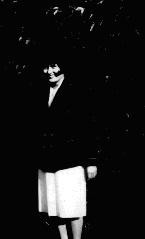

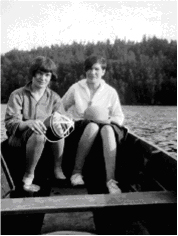
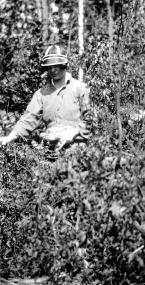
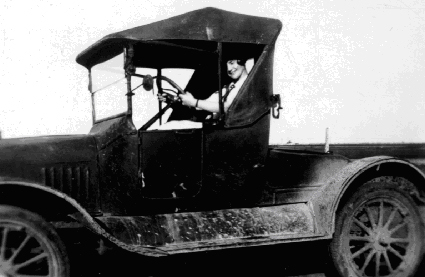
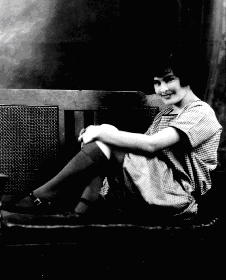
One
day, having completed my work at Manyberries, I got a ride to Bow Island
with a school inspector, and then on the train to Medicine Hat to fill
in the time the train left that point for Lethbridge. While in Medicine
Hat I heard of the riot that day in Estevan where the miners were on
strike, and that Buck, a member of the R.C.M.P., had been pulled off his
horse and was injured. Through the courtesy of the telegraph operators
at Medicine Hat and Estevan I got a report on his condition before
leaving Medicine Hat.
The
Calgary Stampede imposed a lot of special duty on members of the
Department, particularly on the occasion of the Ball in the Hotel
Palliser, and the Investigators at Medicine Hat and Lethbridge were
called in to assist. On reporting at the office to ascertain what my
duties might be, I saw the duties drawn up by the Inspector assigned the
Medicine Hat to one floor, and I to one four floors away, and the
sentence "Acting Sergeant (so‑and‑so) will be in charge of all members
of the Department." The Medicine Hat Investigator was then in the
Inspector's office talking to him, and when he came out I went in and
found that the Inspector had gone out another door, and was gone for the
day. I later got him on the telephone and asked if there had been a
slip‑up in putting the Acting Sergeant in charge of all personnel of the
Department on duty at the Palliser that night and was informed that
there had not been a mistake, that was the way it was to be. I answered
that it was the way it would be, but if circumstances arose which I
thought an Investigator should handle, I would do that. Before going
off duty the next morning, affairs at the hotel having been without
incident (I saw one elderly man going down a corridor wrapped in a hotel
blanket to cover his nakedness). I put my complaint in writing and
left it for the Inspector before leaving for Lethbridge my tour of
special duty having been completed.
Some
weeks later, I was in Coleman when I heard that there had been some
thefts from a way car which was being worked that day between Aldersyde
and Lethbridge. I got back to Lethbridge about midnight, and caught the
northbound way freight which left about 6 a.m., and made enquiry at the
various points where the car had been worked getting particulars of the
missing goods. We arrived at Aldersyde late in the evening, and stayed
there awaiting the arrival of southbound trains for Lethbridge and
Macleod. The Lethbridge train set off two way cars for the Aldersyde
subdivision, which I had just covered, and the cars were spotted at the
south end of the yard, so before boarding the train I had been
travelling on to go to Calgary, I thought I had better take a look at
the two cars set off. The west side was OK, but as I started back up
the east side, I found a door open and heard some sounds out in a
field. It was a moonlight night, so I crept through the fence without
making a sound, and moved so that the moonlight was behind as I
approached a man who was busy going through merchandise he had taken
from the cars. I arrested him, handcuffed him, and took him to the
caboose I had been travelling in and gave the conductor my gun telling
him to use it if the man gave any trouble. I returned to pick up the
goods he had in the field, finding four or five other cartons along the
fence, and I picked up all the goods and took them to the caboose. As
the train moved away, the conductor signalled to stop at the station,
and I asked the operator to ask Calgary to have a car meet us at the
switch as I had a prisoner and a quantity of merchandise to be taken to
the office. This was done, and some days later the thief was sentenced
to six months' imprisonment.
This
was the first time anyone had been caught at Aldersyde although thefts
were believed to have occurred there on various occasions somewhere
along that line. The case stood me in good stead for some weeks later
Gen. Panet came up from Montreal, and the Assistant Chief from Winnipeg,
to deal with my complaint, a decision being made to move me from
Lethbridge, and I was transferred to Vancouver, where I had been on a
temporary two month assignment in 1930, when Margaret and I stayed at
the home of her paternal Aunt Nellie and her husband Sid Newell.
After
we left Winnipeg, our contacts with other members of the family became
sketchy ‑ no one would get a medal for being a correspondent.
At
Vancouver we got a suite in Engelsea Lodge, on Beach Ave. at the south
entrance to Stanley Park. We were in a ground floor suite facing on
Beach Ave., and Margaret and Hugh spent long hours watching the traffic
to and from Stanley Park. One night, shortly after we went to bed,
Margaret said "Some one in the next suite is snoring awfully loudly." I
told her I hadn't heard any snoring, so she said "Just wait." Seconds
later she said "There it is" I said, "That's not snoring ‑ it's the
Point Atkinson foghorn." Christmas lights were put on a tree inside
Stanley Park, and Hugh enjoyed watching them ‑ in fact one night when
looking at the lights Hugh came out with his first word ‑ "Pretty." I
had to go uptown to get a Christmas tree and walked back with it in a
drenching rain. As the weather improved I used to take him out for
walks and one day he did quite a bit of walking and running up and down
a small incline ‑ I was filled with remorse the next day when he had
difficulty in climbing up on a couch as his muscles stiffened up.
Margaret also took him into the Park and let him play in the puddles the
tide had left on rocks.
On one
occasion, knowing that I would be in Victoria for several days, I took
Margaret and Hugh along for the voyage. We went out Burrard Inlet, past
the Lion's Gate into English Bay, and as we swung around Point Grey into
the Gulf of Georgia, the ship began to rise and fall gently. We were
sitting out on deck and Hugh said, "Swing, daddy, swing," With that
Margaret put her hand to her mouth and rushed inside. I followed and
arranged for her to be accommodated in a stateroom where she remained
until we got to Victoria.
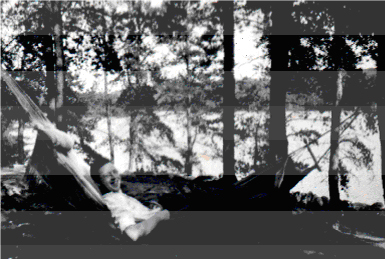
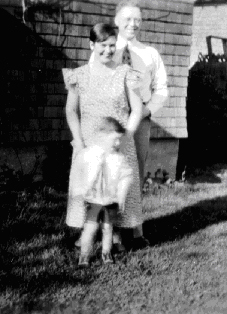
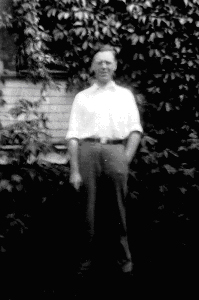
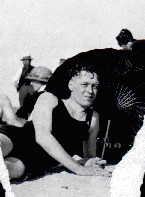
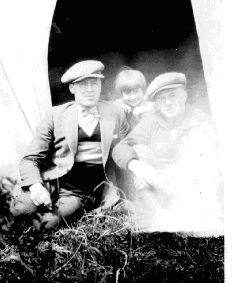
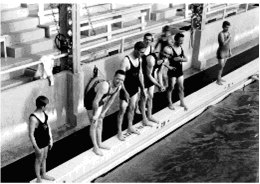
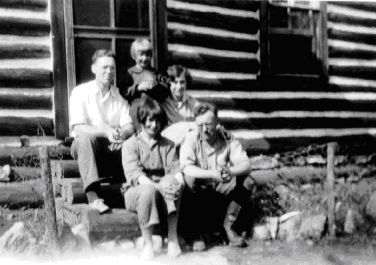
While
I did considerable work in Vancouver and vicinity, my "territory" was
the main line from Vancouver, and from Sicamous to Kelowna. As
economies were being considered in 1932, with the possibility that
constables might be withdrawn from some stations on the main line, it
was decided that it might be desirable to station me at Kamloops, and I
was transferred there in 1933. During the course of time box car thefts
had been occurring on the main line and it seemed that another
Investigator and I spent weeks at a time riding freight trains between
Vancouver and Ruby Creek, checking the train at Coquitlam, Mission and
Ruby Creek. We usually took lunches with us and one night as we were
eating them, the trainman offered us a cup of coffee, and handed us a
small jar saying "Here's sugar." We thanked him for his kindness and a
few minutes later he began to berate his wife for only giving him about
half the usual apple sauce. It then developed that in the dim lamplight
in the caboose we had put apple sauce in our coffee instead of sugar.
We would ride back to Vancouver on the early morning train having
breakfast in the diner with the sleeping car porters. On Saturday
night I would ride the train through to Kamloops, returning to Vancouver
Monday afternoon to resume riding that night.
On one
occasion, I went to Vancouver to assist a Toronto Investigator who was
escorting a prisoner back to Toronto (he had been working in a printing
plant in Toronto where C.P. Express money orders were printed and he had
held out some sheets which had been discarded for errors, etc., and
passed them off as genuine until he was apprehended in San Francisco),
It was during the winter and poor weather was in sight when we left
Vancouver. At Kamloops we were informed that an engine had been
despatched from Revelstoke to meet us at Sicamous to assist us east. It
was snowing as we neared Notch Hill, and when we got to Sicamous we were
informed that the other engine had been stuck in the snow near Three
Valley, so the little engine that handled the passenger train from
Sicamous to Kelowna was turned out to assist us. By the time we got to
Three Valley it was snowing heavily and we waited for a westbound
snowplow with double engines to clear the switch so that we could
proceed. As the plow passed our engines, they shouted "Go like hell'.
I was in the observation car with the conductor and a trainman when we
felt a jar and the train came to a stop. The conductor said to the
trainman "Do your stuff" so he picked up the flagging kit and set out,
the conductor having told him to see if the snowplow could do anything
as the Superintendent and his car were with the snowplow. In the
meantime I went to the other Investigator and told him to get his
prisoner and we would have breakfast. While we were in the diner, the
engines from the snowplow came and coupled on to our train. They were
only able to move three cars, leaving one sleeper next the diner. As
we had breakfast more slides were out the windows. The next time the
snowplow engines came, they were only able to get the sleeper behind the
diner.
There
was a labor camp at Three Valley, and the Superintendent suggested that
I go to the camp and see how many men would come to shovel snow. It was
so windy that as they raised their shovels to throw snow away, the wind
blew it off. There had been snow sheds at that point, but as there had
not been slides for some years and the sheds deteriorated and were
dismantled and not replaced. The Superintendent's cook worked valiantly
to feed those of us who had been on the train, and that evening it was
decided to send us back to Kamloops to take the C.N. to Edmonton, thence
to Calgary on the C.P. The day after we got to Calgary where I was
relieved, the equipment we had been on reached there looking as though
it had been through a war zone because of the many broken windows. I
had to go to Edmonton to return to Kamloops on the C.N. where
transportation was in a mess ‑ washouts between there and Vancouver had
tied up both lines. Several trainloads of passengers on both C.N. and
C.P. taxed the facilities and food was running short. The C.N.
passengers were taken to Prince Rupert en route to Vancouver, and C.P.
passengers went to Penticton and then on buses to the most convenient
point on the G.N. to Seattle and thence to Vancouver. I had about ten
days at home before getting to Vancouver on the first train, a C.N. one.
In the
lower Fraser River region, the snow had turned to rain, and the heavy
rains caused many washouts, and as the weather had turned colder the
rain had frozen, and the weight of the ice broke branches off trees,
power and telephone lines and isolation was general.
During
the years Dad looked after Bill, and we seldom saw him. One night, on
returning to Asa Court, Margaret and I saw someone lying in the door of
our suite. It was Bill who looked as though he had come off a freight
train. We got him cleaned up and he spent several days with us, then
took off again. One day in 1929 I heard he was to appear in Winnipeg
City Police Court. I went to the jail and saw him when he told me he
had been laid off with the rest of a gang and they had gone to the
Relief Office to obtain welfare. During interrogation he admitted that
he had a life insurance policy that was in good standing, He was
charged with attempting to defraud the City. I spoke to Andy Moffat,
the Crown Prosecutor, and when Bill's case was called before the Police
Magistrate, Sir Hugh John Macdonald, the Crown Prosecutor turned to me
as Bill had pleaded "Guilty".. I spoke on Bill's behalf that Bill had
gone to the Relief Office following the leadership of the other men, and
as he was truthful and frank he did not attempt to conceal what might be
regarded as his assets. I also told of his childhood accident, showing
his scars, and his handicap as a result. While Sir Hugh John recorded a
conviction, he did not impose a penalty.
In
1934 dad telephoned me and told me Bill had been killed in an accident.
He had jumped off a truck while it was moving, lost his footing and
fell, a wheel crushing his skull. With Dad, I attended the funeral and
Bill was buried in Brookside Cemetery in Winnipeg.
In
1935, I was transferred back to Vancouver, and shortly afterwards there
was a dock workers strike entailing much overtime for which the
uniformed members of the Department were paid, the constables receiving
more than the Investigators, the Sergeants more than the Inspector.
Then the relief workers staged a protest at Princeton, and had to be
restrained by the Provincial Police from taking over the Kettle Valley
passenger train to Vancouver. I was sent to Merritt to meet a freight
train which they had boarded, but all I could do was to speak to the
leaders to warn the men not to break seals on loaded cars. There were a
couple of hundred of the men, and ten B.C. Provincial Police joined me
at Spence's Bridge, and they accompanied us to Vancouver. This group
became known as the "On‑to‑Ottawa" trekkers, and the dock workers tried
to get them involved in their strike without success and after a
"sit‑in" at the General Post Office, the marchers went on east, winding
up in the Regina Riot.
During
the course of several years, U.S. authorities at Honolulu had assessed
heavy fines against several of the C.P. ships following drug seizures
which were said to have arrived in Honolulu on these ships, threatening
to withdraw the right for them to enter that port, To combat the drug
traffic, one Investigator and two constables were assigned to each of
the Pacific Empresses, the Japan, Canada, Asia and Russia, and the
Company's efforts to restrain the drug traffic were cited as a model for
other steamship lines. In the fall of 1935, while the dock workers'
strike was on, I was assigned to the duty of Master‑At‑Arms on the R.M.S.
"Empress of Canada" , my first voyage being a "makee learn" with the man
I was to succeed. The tour of duty for such an appointment was for
seven voyages sailing from Vancouver, calling at Victoria, Honolulu,
Yokohama, Kobe, Shanghai, Hong Kong, and Manila, calling at the same
ports homeward bound.
Margaret
was preparing another surprise for us, and on one trip as we neared
Shanghai I got our wireless operator to get Point Grey wireless station
to phone to see how Margaret was, the reply being that she was at home
and all was well. We left Shanghai the following evening, and shortly
after sailing I was called to the cabin of the 2nd Purser who said a
coded message had been received saying that a son had been born that
morning. We were west of the International Date Line, and it was March
26th, 1936, but in Vancouver it was still March 25th. That voyage the
"Canada" went into dry‑dock at Hong Kong and Ian Mathieson was six
weeks old before I saw him.
Several years before, the people from whom we had bought the house at
537 Stiles Street, resumed control of it, and in the passage of time a
bank in Vancouver got in touch with me about it, and for a consideration
I signed a quitclaim for it.
On
returning to Vancouver on my last voyage in 1936, I had expected to
resume duty in Vancouver, but on arrival at Victoria, I found a letter
notifying me I was being transferred to Moose Jaw, forthwith, and we
reached there about the beginning of November where we booked in at the
Grant Hall Hotel. A day or so later, Margaret and Hugh developed
mumps. We looked at several houses, and the outlook was bleak until
Inspector Chesser, who was retiring at the end of the year, offered to
rent us his house if we would accommodate him until his departure for
Scotland after the New Year. We accepted his offer.
Dad
was then pastor of the Baptist church at Congress, not far from Moose
Jaw, so after we got settled in the hotel awaiting the arrival of our
household effects from Vancouver, Hugh and I went to Congress for a
visit. We slept in an upstairs bedroom, and the stovepipe from the
heater below came up through the floor. The next morning, I went out
the side door and saw a coverlet, soaking wet, lying on the door step.
I asked what had happened, and Jessie, who had been sleeping in a
bedroom opposite ours, said Dad had lit a fire in the heater and an air
current had brought the odor of something burning to her. On looking
into our room, she saw that the coverlet had fallen to the floor and was
touching the stovepipe and was smouldering, so she grabbed it, took it
downstairs and outside where she dowsed it with water.
Those
years became known as "The Dirty Thirties" when many farmers abandoned
the southern prairies due to the drought, poor crops and lack of
pasture. In the spring of l937 leaves started to grow on trees, but by
the time they were the size of a finger nail, all growth stopped due to
lack of moisture. In homes the housewives laid damp towels on window
sills and at doors to keep out the all pervading dust. Nineteen thirty
eight was a better year, and things seemed to be getting back to normal
when war broke out.
Isabel
came to Moose Jaw and stayed with us for some months before returning to
Winnipeg, where shortly afterward she married Warren Hartley in a civil
ceremony at the office of Mayor George McLean of St. Boniface. Warren
was with a photograph company, and they later moved to Carman where
Warren continued in that business, while Isabel went nursing. With the
outbreak of war, Warren became an instructor in a trade school at Logan
& Sherbrook, later serving with the R.C.A.F. at various points, finally
settling in B.C. after the war. Isabel became a nurse in North
Vancouver General Hospital, and one stormy evening she was driving home
in the rain, and on coming around the shoulder of a mountain she met a
transport truck head‑on with fatal consequences. I went to Vancouver
and found that the inquest had been completed that morning in North
Vancouver. I attended at the funeral parlor and was present at the
service, Warren having arranged for cremation. He gave me Isabels watch
to give to Jessie.
Margaret's mother died in 1940 ‑ the only death in that family until
her father passed away in 1964. Although little has been said in this
chronicle about the Hughes family except to give Margaret's name, the
fusion of Hughes and Sutherland became so complete that either could
speak for the other with confidence and affection. William "Billy"
Hughes was born at Seeley's Bay, near Kingston, Ont., in Sir John A.
Macdonald's riding, which may explain why "Billy" was a staunch
Conservative and an Orangeman. He came west in the eighteen nineties
and worked for the Bridge & Building Dept. of the C.P.R. He married Rosa
Lester, who had been born in London, England, and they set up the
Lilyfield Dairy near McGregor & Atlantic, and in 1904 they moved to
Rosser Road & Kitchener, (now King Edward & Inkster). They had nine
children, Margaret, Birdie, Bert, Violet, Hazel, Jack, Kay , Grace and
Ted.
The
first contact I had with Mrs. Hughes was when I was getting our marriage
license and I had to phone her to get Mr. Hughes' Christian name. I met
her, and other members of the family the night Margaret and I were
married, and Mr. Hughes the Sunday after. For some years the milk from
the Lilyfield Dairy was peddled along Logan and Alexander Avenues, and
in the Point Douglas area, the drivers pouring milk from ladles into
containers supplied by the customer.
After
Mrs. Hughes' death and the outbreak of war, Mr. Hughes had difficulty in
getting help to operate the dairy (he had forty head or more of
Holsteins) and the herd was auctioned off and he put part of the pasture
into crop and then let it out on crop shares, finally selling it to a
holding company. He stayed on in the house with Kay as a housekeeper
until family duties and the education of her children made a move
necessary. Even then he refused to move and "batched it" there until
the end came in 1964.
The
land was eventually acquired by a development company and was built up
and named "Tyndall Park". As the area was flat, the development company
scooped out a considerable area to serve as a "retention pond" for
surface water, and it was named and a cairn put in place bearing a metal
tablet inscribed:
BILLY
HUGHES LAKE
TO REMEMBER
A MAN
OF ENERGY AND GOOD HUMOR
AND HIS FAMILY WHO
MADE THEIR HOME AND LIVELIHOOD
(LILYFIELD DAIRY)
ON THESE ACRES OF GROUND
FROM 1905 TO 1964
Margaret's latest secret was revealed on Oct. 21st, 1940, when Neal
Sloan arrived on the scene. The house we were in was sold and we had
to move on Feb. 28th, 1941. The Cartage Co. had four furniture moves
that day in a chain sequence. As one house was vacated, the next moved
into it. We were the last in the line‑up and they didn't reach us until
late in the evening. About midnight the men wanted to quit but the
manager persuaded them to complete our move. Fortunately we had some
friends living about four doors away on the same street and they had
arranged to accommodate us and Neal. Hugh and Ian were at the home of
another friend, had a good night, and a hilarious tale to tell us the
next morning.
At the
end of 1943, I was transferred to Winnipeg, while Margaret and the boys
remained in Moose Jaw to complete the school year. When summer holidays
arrived in 1944, they came to Winnipeg, but I had been informed that I
was being transferred to Fort William, having been promoted to
Inspector.
We
have many happy memories of Moose Jaw ‑ the nightly chorus of coyotes
howling in the hills, prickly cactus and "knock, knock" jokes. "Knock,
knock." "Who's there?" "Pearly." "Pearly who?" "Pearly Gates Ajar."
And the roar of laughter one day when we were cleaning up the yard and I
asked Ian to put the storm windows away in the shed. I hadn't heard him
when he had asked me three times before in the preceding few minutes
what he should do with the windows.
As an
Investigator I had on many occasions to make enquiries or searched for
lost articles, quite often successfully as searches disclosed that
articles had merely been misplaced, but when it came to diamond rings
and wedding rings which had been left on ledges in washrooms it was a
different story with one exception. On this occasion a woman reported
that she had used the toilet in a coach on a local train just before it
had arrived at Swift Current, and moments after detraining at Swift
Current and while the passengers were still on the platform she reported
them missing and enquiry was immediately started by the local staff, and
although one woman was questioned she denied knowledge of the rings. I
was sent to Swift Current, made some enquiries and was assured by the
conductor that that particular woman was the last to enter the toilet
before arrival at Swift Current. She was the wife of the section
foreman at Sceptre. The train reached there late in the evening and the
section foreman was on the platform and was pointed out to me. I told
him I wanted to see his wife and he accompanied me to his house. His
son, a law student had just reached home that evening, and a little
later, as the foreman's wife did not put in an appearance, the son asked
me what I wanted to see his mother about. I told him it was about some
rings and I thought his mother might be of some assistance in the
enquiry. He asked what the outcome might be, and I said that the railway
company only wanted to assist the owner of the rings, and I thought if
they were forthcoming the owner would be satisfied with their return.
He then went out of the room but returned in a few minutes and handed me
the rings. I caught a coal train later that night and made connection
early next morning with the transcontinental to Moose Jaw, and a
message was sent that morning, Dec. 24th, to the owner at Empress that
her rings had been located and were being forwarded to her.
One
morning a message was received at Moose Jaw telling that a man who
detrained at Regina had lost a watch which he stated had slipped ahead
of his fingers as he felt for it while dressing just before detraining.
The sleeper had been set off at Moose Jaw, so I went to it, saw the
porter who had put the beds away without seeing a watch. He stripped
down the section but we couldn't find the watch. When that word was
sent to Regina the response was that he was certain the watch had been
left behind, that it slipped down behind something as it ran ahead of
his fingers while stretching for it and he didn't have time to report it
before getting off the train. Returning to the sleeper, and with the
assistance of the porter, the section he had been in, the adjoining
sections, and the three sections opposite were stripped down and
searched, even going so far as turning a sheet of paper into a cone to
listen at the pipes running along the inside of the car in case a "tick"
might be heard, with a similar result. The Inspector told me to go to
Regina, see the passenger and explain what we had done.
At
Regina, the man had booked in at the Hotel Saskatchewan, but he was out
and didn't return until late in the evening. As I didn't know him and
our Regina Investigator had gone home, I had to keep observation in the
corridor to intercept him on his return. Two men showed up late in the
evening and entered his room. I knocked at his door, introduced myself
and started to relate what had occurred. He invited me into the room,
listened to me, then told me that our Regina man had spoked to him, had
searched his suitcase which his wife had carefully packed, disturbing
the contents, then told me "My friend called for me and took me for a
ride this afternoon. As we started away I crossed my legs, then said
to my friend "stop the car" which he did, then I said "feel my ankle"
and he did and said "that's your watch". It was, and it must have
slipped down and fell inside my sock as I was dressing, and I didn't
notice it as I was wearing long underwear. "
On
another occasion, a lost watch was found hanging inside the owner's
trousers, having been slipped there instead of being put in the watch
pocket.
While
in Moose Jaw. it was usual for several of us to be on hand while the
various trains were arriving or departing so that he would be handy if
any complaints were received. One day the Sergeant brought over a
passenger who had reported the loss of his wallet and their search for
it had been fruitless. I asked "Have you searched his pockets?" and was
told that such a search had been made. I said "Well, to satisfy me,
would you please search again?" So they searched again and when going
through the pockets of the raincoat the man was carrying, the wallet was
found.
On
another occasion, a woman with several children, boarding a train for
the west, reported the loss of her wallet. I hurried to the home of her
sister where she had been visiting and there asked where the sister's
baggage had been standing. The wood box was pointed at, and on
searching it the wallet, containing several hundred dollars, was found
and I was able to hand it to the woman before her train left.
One
day we were in the usual location talking with the local reporter,
Harold Davis, when someone came to us with an enquiry which appeared to
be directed at me and I answered. Harold asked, "Why is it, Tom, that
they always ask you?" I couldn't resist answering, "Well, I guess they
want to speak to the intelligent looking one."
By the
dint of a lot of footwork and diligent enquiry, I located a house to
rent at 211 South Norah St., in Fort William and it was a pleasure to
resume acquaintance with Ruth, and to get to know Syd who was then about
five.
At
Fort William my office was on the third floor of the depot, and Hugh and
Ian often dropped in. After they had been there one day, I heard that
the girls in the Superintendent's office on the second floor were
concerned about one of the girls as they thought "she had been imagining
she had seen things" for she had called out "Look at the aeroplane" but
there was nothing for them to see. When she called again "There it is"
there was nothing for the others to see. I had to explain that Ian had
a small plane which he had been dangling out of my window, and that was
what the girl had seen.
On
another occasion the boys were at the office, and as Ian had been asking
to smoke for quite a while, I said, "OK, so have a smoke" and handed him
one of my cigars. In a very few minutes he turned pale and was deathly
sick and we had to lay him out on a table to recover, and when we got
home I had to eat humble pie.
On a
wall of one of the electrical substations on Syndicate St., in Fort
William, was a large painting depicting Kakabeka Falls which Ian
maintained were the biggest falls in the world, perhaps because at Fort
William the schools emphasized matters of local interest and endeavored
to instill loyalty and enthusiasm for the region. That idea got a bit
of a setback when he saw Niagara Falls. When visiting Dollie in London,
Jack took us there on a trip, passing through Woodstock on the way, and
in front of a farm we saw the effigy of a Holstein cow which had
established a world's record for production of milk. We stopped and
took a picture of it as Margaret's father also had Holsteins. When the
picture was developed who was on the other side of the cow pulling her
teats? Ian, of course, but after seeing Niagara he quit bragging about
Kakabeka.
We
spent "V.E." day in Fort William, but I was transferred to Moose Jaw,
June 1st, 1945, and was in Regina for "V.J." day, having been appointed
Inspector of the Saskatchewan District. If we had trouble in finding a
house in Moose Jaw in 1936, it was nothing like that in 1945. we spent
ten months living in two rooms in the Grant Hall Hotel before I was able
to secure (for a consideration) accommodation in a house on High Street.
In the
meantime, Buck, who had lost a leg due to gangrene infection, rejoined
Ruth at Fort William, and Jack, with a Scottish wife and daughter,
Christine, went to London where Grant and Dollie were established. His
marriage did not pan out, and his bride returned to Scotland taking the
daughter with her, and Grant and Dollie took over the house he had
planned on occupying in London.
Dad
and Jessie had moved to Shaunavon where he was the pastor of the Baptist
church, and we heard on various occasions that "Dad had a fall" or "Dad
had another fall," and finally "Dad was in hospital for a couple of days
having had another fall." He eventually was relieved of his duties as
pastor and Jessie came to Moose Jaw where she became the Secretary of
the Family Service Association, and they moved to Moose Jaw. One day we
heard that Dad had fallen while preparing lunch, knocking the oil stove
over and upsetting everything. He was brought to our house where he was
put to bed, and Margaret had quite a time helping him to and from the
bathroom. The following morning he appeared to be sleeping, but as
Margaret couldn't arouse him, Dr. Gordon Young was called, and dad was
admitted to Moose Jaw General hospital. His speech and equilibrium
were affected. He was later transferred to a convalescent section of
Providence General Hospital, and I visited him each day after lunch,
shaving him when necessary. Dollie assisted me in defraying the
hospital bills with an occasional contribution from Buck and Jack, until
the C.C.F. government in Saskatchewan introduced free hospital service
for the aged.
We
moved into a house on Main Street, where we remained until 1950 when I
was transferred to Winnipeg as Inspector of the Manitoba District, and
supervised work in the office of the Asst. Chief of Western Lines.
Mary Lou took over the duties of Dad's valet. Several years later, I
received a message that Dad wasn't well and perhaps I should come to
Moose Jaw. Just as I was boarding the train that evening I was
informed that he had passed on, and arrangements were made for Margaret
to follow me. Mary Lou and Jessie met me at the station, and
arrangements were completed and Dad was buried in Moose Jaw Cemetery.
Funds I had on hand (Dad had received a meagre pension from the Baptist
Union, and at Jessie's request these funds were banked) and were used to
defray the funeral and cemetery expenses, while Jessie requested the
privilege of supplying a headstone.
In
1960 I was appointed Superintendent of the Prairie Region, there having
been a reorganization of the Department, Western Lines having been
divided into the Prairie and Pacific Regions. I held that position
until retiring in 1964.
As the
years passed, Hugh did very well in school, and on graduating from
Central Collegiate High School, Moose Jaw, he was awarded the "Governor
General's Medal" and became the recipient of a scholarship at McGill
University in Montreal, under the auspices of the C.P.R. One summer he
visited with Dollie and Grant in London, and there he had his first
job, in an ice cream parlor. During high school, Margaret and I often
wondered how the kids could study for we would come home and find Hugh,
Benny Wong, Bill Cedar and Ruth Bjordammen engrossed in study with the
radio turned on full blast with "Rag Mop" or some such tune and their
feet beating time with the tune, and they all finished with high
standings. One summer he worked at Banff Springs Hotel but it wasn't
lucrative although he had an opportunity to be an extra in a moving
picture starring Randolph Scott. The next year or two he worked in the
linen room of the C.P.R. S.D.& P.C. Dept. at Moose Jaw. He graduated
from McGill with an Honours B.Sc. degree in Chemistry. Margaret and I
were in Montreal for the graduation exercises.
As we
had moved to Winnipeg that year, he continued his studies on a bursary
at the University of Manitoba, and with an M.Sc. he obtained an
appointment at R.M.C., in Kingston, Ont,, and completed a thesis for
which he was awarded a Ph. D. During his sojourn in Kingston he
returned to Winnipeg and married Mary King and they had a year and a
half in Kingston before he took up employment with the Shawinigan
Chemical Co., at Shawinigan Falls, P.Q., where they remained for eight
years during which time they had a daughter, Lisa Margaret, and two
sons, Thomas Stanley and Murray Hughes. Lisa became quite fluent in
French which she learned from her playmates. Hugh entered the service
of the Imperial Oil Co. at Sarnia, Ont., in 1964 when they were
organizing their Plastics Division, and he is still there. Lisa
graduated from Western University, London, Ont., in 1979 with a B.Sc.
Tom graduated from Sir Wilfred Laurier University at Waterloo, Ont.,
and Murray graduated from Lambton College in Sarnia.
Ian
started school in Moose Jaw, and carried on in Fort William and back to
Moose Jaw and into High School in East Kildonan which did not go beyond
Grade X, and he then had to go to St. John's High School in Winnipeg's
north end, which didn't work out so well. He got employment with the
C.P.R. Sleeping & Dining Car Dept., and worked for several years on
dining cars, and then in the Coach Yard office of that Department. He
was given an opportunity to work for the Greater Winnipeg Gas Co.,
serving as P.R. for that Company. He married Joan Otter and this year
(1980) they celebrated their twentieth anniversary (it was also the
twenty fifth anniversary for Hugh and Mary.). Ian and Joan have two
daughters, Jami Dell who graduated from Oakbank High School in 1979, and
is now in the employ of the Canadian Press, and Jodi Lee who is entering
Grade Vll at Oakbank this fall.
In
time Neal also found the East Kildonan High Schools disappointing, and
he entered the Technical School in the old Ford assembly plant building
on Portage Avenue, (now known as the Robert Fletcher Building), the
forerunner of the Red River Community College and took an electrical
course. He enlisted in the R.C.A.F. and served at various installations
in Canada and the U.S. where he was trained in the maintenance of
technical Equipment at various R.C.A.F. stations. When his engagement
with the R.C.A.F. expired, he was placed on the Reserve, and was
employed by C.A.E. a company which held contracts for the maintenance of
technical equipment at various R.C.A.F. stations. In the course of
visits to stations in northern Ontario, he became acquainted with
Therese Verrault at Hearst, Ont., who had been born in Quebec, and
became engaged to her. We motored to Hearst with Neal for the wedding,
and Hugh and Mary came up from Sarnia, Returning home, we accompanied
Hugh and Mary to North Bay where we caught a train for Winnipeg.
Therese had a delightful French accent and a working knowledge of
English having had some commercial experience. She had no trouble
finding employment at Winnipeg, as Neal was out of town a lot, but an
opening occurred with the C.A.E. for supervision of an installation at
Fort Nelson, B.C., and Neal applied for, and got the job. We were
there for Christmas one year, and as Arlene was on the way we waited for
her arrival. In the course of time they bought a trailer on a site
about three miles from Fort Nelson on the Alaska Highway. Mike was
attending school and there got employment in an accountant's office, and
Arlene was accommodated at the home of a daily baby‑sitter. In time the
C.A.E. lost the contract for the installation which was taken over by
the Marconi Co. which retained Neal's services, and as he had a lot of
time on his hands he had other interests. Fort Nelson had it's
drawbacks, and they came to Winnipeg where Neal again joined the C.A.E.
working with equipment he knew. An opening occurred for employment on
the DEW line, and after taking a course in Illinois, he was assigned to
a station the most northwesterly one in the Northwest Territories. It
was winter, and the isolation and absence from his family impelled Neal
to resign and return to Winnipeg, and the training received at Streator,
Ill., qualified him for work on an installation at Flin Flon, Man.
As
accommodation at Flin Flon was limited, the firm he was working for
brought his trailer from Fort Nelson to Flin Flon, and they found a site
for it at a tourist camp in the vicinity, While at Flin Flon, Neal and
Therese became devout members of the local Baptist Church. Becoming
dissatisfied with conditions at the installation, Neal resigned, sold
the trailer and came to Winnipeg where was again employed by C.A.E.
Opportunity for social services opened and Neal and Therese dedicated
themselves to such endeavors, and they were engaged by the Mennonite
Central Committee to take charge of a rehabilitation center for released
long term convicts at Mascouche, Que., near some important penal
institutions and near Montreal. It was a rural area and when they went
to enter Mike in the nearest English school they found he would be set
back a grade, but on making enquiry at a French school they agreed to
let him keep his grade and promised to give him assistance with French.
It proved to be an excellent choice. Arlene, of course, started in a
French school, and both became proficient in French.
As the
venture at Hillside Retreat at Mascouche did not develop or receive the
hoped for response from parolees, the Mennonite Central Committee
suspended Hillside Retreat. Neal and Therese then took charge of a
"Group Home" under the auspices of Ausable Homes at Mountain, Ont.,
where they now have five boys in their care. Mike, being fluent in
French, was admitted to a French school in the area, but Arlene had to
attend an English one as they did not have her grade in the French
school.
In the
course of time, Jessie and Mary Lou bought a house, 1216 Third Ave.,
N.E., Moose Jaw, and some time later Mary moved to Regina and worked in
the new Government Building on Victoria Ave. She married a man with two
children, Gordon K. Fuhr, who worked for the Regina Leader Post. Jessie
retired from the Family Service Bureau , but remained in Moose Jaw until
her health became a problem and she moved to Regina where Mary Lou and
Gordon had accommodation for her in their home. She developed cancer
and suffered a lot before passing away in 1977. Dollie and I went to
Regina and stayed with Mary Lou and Gordon, and Frank and his wife Peggy
came from Oshawa. The funeral was held in Moose Jaw, and Jessie was
interred alongside Dad in Moose Jaw Cemetery.
Dollie
stayed over in Regina to assist Mary Lou in going through Jessie's
effects. Frank and Peggy decided I should have company on the way home,
so they alternated in riding with me while the other drove their car.
Margaret had supper ready for us on our arrival, and as Frank and Peggy
wanted to get on to Kenora for the night, they left immediately after.
Dollie
and Grant sold the home on Langmuir, and purchased a nice house on high
ground (Grant is a wireless ham and has his own station VE3AJP) in the
Southdale area of London, a rural area, but it is now engulfed in
London's expansion. After Grant retired from Ontario Hydro, they began
spending their winters in Florida, and Grant keeps in touch with things
in London, and with his "ham" friends throughout the country.
Jack
(did I explain that he preferred to be known by that name instead of
Moffat?) eventually retired from the Customs service but remained in Port
Credit in a suite that he has occupied for many years, The last time he
visited us was a couple of years ago. He had various operations over the
years, an arterial bypass in his legs, but we only heard of these
casually. This March I received word that some friends had found him in
a dire condition and he had been admitted to Mississauga General
Hospital. I went to Port Credit and stayed there for a little over a
week, as his condition improved but cancer had been detected. And after
my departure it was decided to remove the left lobe of his lungs. After
being discharged from hospital, he returned to his suite, but the cancer
crept through his system and in August he was admitted to hospital again.
By that time the cancer had progressed to the degree that it had deadened
the pain center of the brain. He succumbed on August 14th, 1980. Dollie
and Grant, and Frank and Peggy had been in daily contact with him, but I
arrived in Toronto just as he was passing away. It was left to us to
decide how his affairs were to be handled, and we decided on cremation,
and after a memorial service the ashes were to be disposed of by Frank.
During
the years we had not had much contact with Frank who now works for the
City of Toronto although he lives in Oshawa. In 1946 Ian told us he had
seen Frank at a circus. Ian was missing that morning and we were told "He
had gone to water the elephants" having left the house about 6 a.m. When
he got home that night he was a tired and dirty boy. Frank and his wife
Peggy are both working and they have a nice home in Oshawa. They had been
very close to Jack until there was a misunderstanding.
Buck and
Ruth had three stalwart sons, Syd, John and Bill. Syd married a nurse
from Fort Frances, and they have two children, Malcolm and Suzanne, and
they live in Thunder Bay where Syd is with the Harbor Police. John also
married a nurse, Sandy, from Balmertown, he stayed with us for some time
while training as an insurance salesman. They had three children, but
John died several year ago, and Sandy remarried and we have lost contact
with them. Bill did very well in school and was awarded an athletic
scholarship at the University of Minnesota. After leaving the U. of M. he
played semi‑pro ball with a team in Swift Current in a southern
Saskatchewan league. He too married a nurse, Lesley, and they live in
Thunder Bay where has become involved as an Industrial Consultant with
the Ontario Ministry of Colleges and Universities.
Ruth
still lives in Thunder Bay, but her health is a problem.
Thanks to Hugh Sutherland
for sending in this account |

